英语二
2023年考研英语二真题试卷+参考答案及解析【详细版】
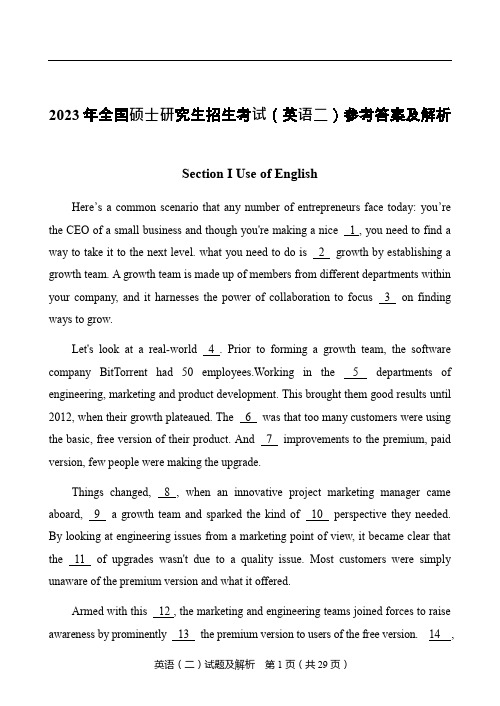
2023年全国硕士研究生招生考试(英语二)参考答案及解析Section Ⅰ Use of EnglishHere’s a common scenario that any number of entrepreneurs face today: you’re the CEO of a small business and though you're making a nice 1 , you need to find a way to take it to the next level. what you need to do is 2 growth by establishing a growth team. A growth team is made up of members from different departments within your company, and it harnesses the power of collaboration to focus 3 on finding ways to grow.Let's look at a real-world 4 . Prior to forming a growth team, the software company BitTorrent had 50 employees.Working in the 5 departments of engineering, marketing and product development. This brought them good results until 2012, when their growth plateaued. The 6 was that too many customers were using the basic, free version of their product. And 7 improvements to the premium, paid version, few people were making the upgrade.Things changed, 8 , when an innovative project marketing manager came aboard, 9 a growth team and sparked the kind of 10 perspective they needed. By looking at engineering issues from a marketing point of view, it became clear that the 11 of upgrades wasn't due to a quality issue. Most customers were simply unaware of the premium version and what it offered.Armed with this 12 , the marketing and engineering teams joined forces to raise awareness by prominently 13 the premium version to users of the free version. 14 ,upgrades skyrocketed, and revenue increased by 92 percent.But in order for your growth, team to succeed, it needs to a have a strong leader. It needs someone who can 15 the interdisciplinary team and keep them on course for improvement.This leader will 16 the target area, set clear goals and establish a time frame for the 17 of these goals. This growth leader is also 18 for keeping the team focus on moving forward and steer them clear of distractions. 19 attractive, new ideas can be distracting, the team leader must recognize when these ideas don’t 20 the current goal and need to be put on the back burner.1.A. purchase B. profit C. connection D. bet2.A. define B. predict C. prioritize D. appreciate3.A. exclusively B. temporarily C. potentially D. initially4.A. experiment B. proposal C. debate D. example5.A. identical B. marginal C. provisional D. traditional6.A. rumor B. secret C. myth D. problem7.A. despite B. unlike C. through D. besides8.A. moreover B. however C. therefore D. again9.A. inspected B. created C. expanded D. reformed10.A.cultural B. objective C. fresh D. personal11.A. end B. burden C. lack D. decrease12.A. policy B. suggestion C. purpose D. insight13.A. contributing B. allocating C. promoting D. transferring14.A. As a result B. At any rate C. By the way D. In a sense15.A. unite B. finance C. follow D. choose16.A. share B. identify C. divide D. broaden17.A. announcement B. assessment C. adjustment D. accomplishment18.A. famous B. responsible C. available D. respectable19.A. Before B. Once C. While D. Unless20.A. serve B. limit C. summarize D. alter【1】B. profit 原文提到“小公司的CEO也挣到了大钱”。
英语二国家线
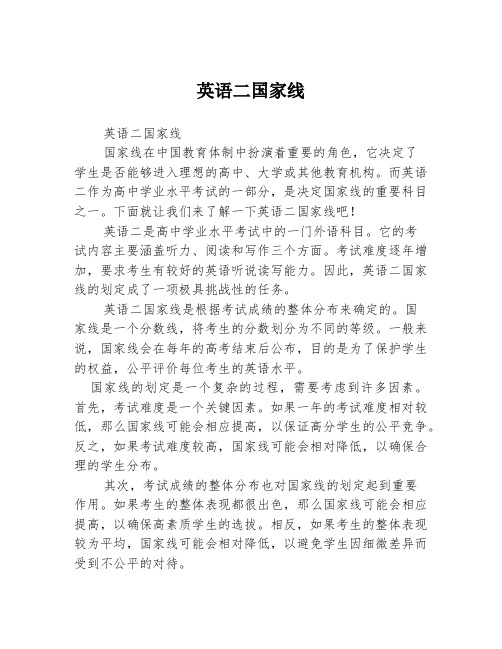
英语二国家线英语二国家线国家线在中国教育体制中扮演着重要的角色,它决定了学生是否能够进入理想的高中、大学或其他教育机构。
而英语二作为高中学业水平考试的一部分,是决定国家线的重要科目之一。
下面就让我们来了解一下英语二国家线吧!英语二是高中学业水平考试中的一门外语科目。
它的考试内容主要涵盖听力、阅读和写作三个方面。
考试难度逐年增加,要求考生有较好的英语听说读写能力。
因此,英语二国家线的划定成了一项极具挑战性的任务。
英语二国家线是根据考试成绩的整体分布来确定的。
国家线是一个分数线,将考生的分数划分为不同的等级。
一般来说,国家线会在每年的高考结束后公布,目的是为了保护学生的权益,公平评价每位考生的英语水平。
国家线的划定是一个复杂的过程,需要考虑到许多因素。
首先,考试难度是一个关键因素。
如果一年的考试难度相对较低,那么国家线可能会相应提高,以保证高分学生的公平竞争。
反之,如果考试难度较高,国家线可能会相对降低,以确保合理的学生分布。
其次,考试成绩的整体分布也对国家线的划定起到重要作用。
如果考生的整体表现都很出色,那么国家线可能会相应提高,以确保高素质学生的选拔。
相反,如果考生的整体表现较为平均,国家线可能会相对降低,以避免学生因细微差异而受到不公平的对待。
最后,考生的报考人数也是划定国家线需要考虑的因素之一。
如果某一年有大量考生报考英语二,那么国家线可能会相应提高,以实现一定程度的筛选。
反之,如果报考人数较少,国家线可能会相对降低,以确保考生的公平竞争。
综上所述,英语二国家线的划定是一个基于考试成绩分布、考试难度和报考人数等多个因素综合考虑的过程。
它的目标是确保学生的公平竞争和选拔优秀人才。
无论国家线如何划定,参加考试的学生都应该根据自身的实际情况制定适合自己的备考计划,努力提高英语水平,取得理想的成绩。
考研英语二词汇
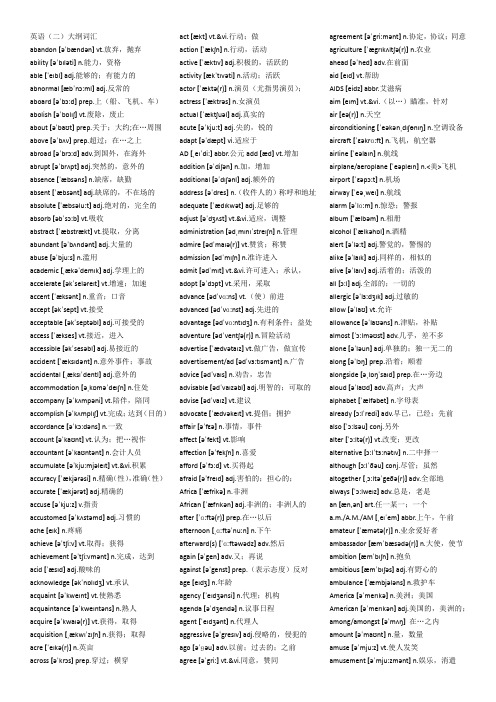
英语(二)大纲词汇abandon [əˈbændən] vt.放弃,抛弃ability [əˈbɪləti] n.能力,资格able [ˈeɪbl] adj.能够的;有能力的abnormal [æbˈnɔ:ml] adj.反常的aboard [əˈbɔ:d] prep.上(船、飞机、车)abolish [əˈbɒlɪʃ] vt.废除,废止about [əˈbaʊt] prep.关于;大约;在…周围above [əˈbʌv] prep.超过;在…之上abroad [əˈbrɔ:d] adv.到国外,在海外abrupt [əˈbrʌpt] adj.突然的,意外的absence [ˈæbsəns] n.缺席,缺勤absent [ˈæbsənt] adj.缺席的,不在场的absolute [ˈæbsəlu:t] adj.绝对的,完全的absorb [əbˈsɔ:b] vt.吸收abstract [ˈæbstrækt] vt.提取,分离abundant [əˈbʌndənt] adj.大量的abuse [əˈbju:s] n.滥用academic [ˌækəˈdemɪk] adj.学理上的accelerate [əkˈseləreɪt] vt.增速;加速accent [ˈæksənt] n.重音;口音accept [əkˈsept] vt.接受acceptable [əkˈseptəbl] adj.可接受的access [ˈækses] vt.接近,进入accessible [əkˈsesəbl] adj.易接近的accident [ˈæksɪdənt] n.意外事件;事故accidental [ˌæksɪˈdentl] adj.意外的accommodation [əˌkɒməˈdeɪʃn] n.住处accompany [əˈkʌmpəni] vt.陪伴,陪同accomplish [əˈkʌmplɪʃ] vt.完成;达到(目的)accordance [əˈkɔ:dəns] n.一致account [əˈkaʊnt] vt.认为;把…视作accountant [əˈkaʊntənt] n.会计人员accumulate [əˈkju:mjəleɪt] vt.&vi.积累accuracy [ˈækjərəsi] n.精确(性),准确(性)accurate [ˈækjərət] adj.精确的accuse [əˈkju:z] v.指责accustomed [əˈkʌstəmd] adj.习惯的ache [eɪk] n.疼痛achieve [əˈtʃi:v] vt.取得;获得achievement [əˈtʃi:vmənt] n.完成,达到acid [ˈæsɪd] adj.酸味的acknowledge [əkˈnɒlɪdʒ] vt.承认acquaint [əˈkweɪnt] vt.使熟悉acquaintance [əˈkweɪntəns] n.熟人acquire [əˈkwaɪə(r)] vt.获得,取得acquisition [ˌækwɪˈzɪʃn] n.获得;取得acre [ˈeɪkə(r)] n.英亩across [əˈkrɔs] prep.穿过;横穿act [ækt] vt.&vi.行动;做action [ˈækʃn] n.行动,活动active [ˈæktɪv] adj.积极的,活跃的activity [ækˈtɪvəti] n.活动;活跃actor [ˈæktə(r)] n.演员(尤指男演员);actress [ˈæktrəs] n.女演员actual [ˈæktʃuəl] adj.真实的acute [əˈkju:t] adj.尖的,锐的adapt [əˈdæpt] vi.适应于AD [ˌeɪˈdi:] abbr.公元add [æd] vt.增加addition [əˈdiʃən] n.加,增加additional [əˈdɪʃənl] adj.额外的address [əˈdres] n.(收件人的)称呼和地址adequate [ˈædɪkwət] adj.足够的adjust [əˈdʒʌst] vt.&vi.适应,调整administration [ədˌmɪnɪˈstreɪʃn] n.管理admire [ədˈmaɪə(r)] vt.赞赏;称赞admission [ədˈmɪʃn] n.准许进入admit [ədˈmɪt] vt.&vi.许可进入;承认,adopt [əˈdɔpt] vt.采用,采取advance [ədˈvɑ:ns] vt.(使)前进advanced [ədˈvɑ:nst] adj.先进的advantage [ədˈvɑ:ntɪdʒ] n.有利条件;益处adventure [ədˈventʃə(r)] n.冒险活动advertise [ˈædvətaɪz] vt.做广告,做宣传advertisement/ad [ədˈvɜ:tɪsmənt] n.广告advice [ədˈvaɪs] n.劝告,忠告advisable [ədˈvaɪzəbl] adj.明智的;可取的advise [ədˈvaɪz] vt.建议advocate [ˈædvəkeɪt] vt.提倡;拥护affair [əˈfɛə] n.事情,事件affect [əˈfekt] vt.影响affection [əˈfekʃn] n.喜爱afford [əˈfɔ:d] vt.买得起afraid [əˈfreɪd] adj.害怕的;担心的;Africa [ˈæfrikə] n.非洲African [ˈæfrɪkən] adj.非洲的;非洲人的after [ˈɑ:ftə(r)] prep.在…以后afternoon [ˌɑ:ftəˈnu:n] n.下午afterward(s) [ˈɑːftəwədz] adv.然后again [əˈgen] adv.又;再说against [əˈgenst] prep.(表示态度)反对age [eɪdʒ] n.年龄agency [ˈeɪdʒənsi] n.代理;机构agenda [əˈdʒendə] n.议事日程agent [ˈeɪdʒənt] n.代理人aggressive [əˈgresɪv] adj.侵略的,侵犯的ago [əˈɡəu] adv.以前;过去的;之前agree [əˈgri:] vt.&vi.同意,赞同agreement [əˈgri:mənt] n.协定,协议;同意agriculture [ˈægrɪkʌltʃə(r)] n.农业ahead [əˈhed] adv.在前面aid [eɪd] vt.帮助AIDS [eidz] abbr.艾滋病aim [eɪm] vt.&vi.(以…)瞄准,针对air [eə(r)] n.天空airconditioning [ˈeəkənˌdɪʃɵnɪŋ] n.空调设备aircraft [ˈɛəkrɑ:ft] n.飞机,航空器airline [ˈeəlaɪn] n.航线airplane/aeroplane [ˈeəpleɪn] n.<美>飞机airport [ˈɛəpɔ:t] n.机场airway [ˈeəˌweɪ] n.航线alarm [əˈlɑ:m] n.惊恐;警报album [ˈælbəm] n.相册alcohol [ˈælkəhɒl] n.酒精alert [əˈlə:t] adj.警觉的,警惕的alike [əˈlaɪk] adj.同样的,相似的alive [əˈlaɪv] adj.活着的;活泼的all [ɔ:l] adj.全部的;一切的allergic [əˈlɜ:dʒɪk] adj.过敏的allow [əˈlaʊ] vt.允许allowance [əˈlaʊəns] n.津贴,补贴almost [ˈɔ:lməʊst] adv.几乎,差不多alone [əˈləun] adj.单独的;独一无二的along [əˈlɔŋ] prep.沿着;顺着alongside [əˌlɒŋˈsaɪd] prep.在…旁边aloud [əˈlaʊd] adv.高声;大声alphabet [ˈælfəbet] n.字母表already [ɔ:lˈredi] adv.早已,已经;先前also [ˈɔ:lsəu] conj.另外alter [ˈɔ:ltə(r)] vt.改变;更改alternative [ɔ:lˈtɜ:nətɪv] n.二中择一although [ɔ:lˈðəu] conj.尽管;虽然altogether [ˌɔ:ltəˈgeðə(r)] adv.全部地always [ˈɔ:lweɪz] adv.总是,老是an [æn,ən] art.任一某一;一个a.m./A.M./AM [ˌeɪˈem] abbr.上午,午前amateur [ˈæmətə(r)] n.业余爱好者ambassador [æmˈbæsədə(r)] n.大使,使节ambition [æmˈbɪʃn] n.抱负ambitious [æmˈbɪʃəs] adj.有野心的ambulance [ˈæmbjələns] n.救护车America [əˈmerɪkə] n.美洲;美国American [əˈmerɪkən] adj.美国的,美洲的;among/amongst [əˈmʌŋ] 在…之内amount [əˈmaʊnt] n.量,数量amuse [əˈmju:z] vt.使人发笑amusement [əˈmju:zmənt] n.娱乐,消遣analysis [əˈnæləsɪs] n.分析analyze/yse [ˈænəlaiz] vt.分析ancestor [ˈænsestə(r)] n.祖先ancient [ˈeɪnʃənt] adj.古代的and [ənd] conj.和,与anger [ˈæŋgə(r)] n.生气angle [ˈæŋgl] n.角angry [ˈæŋgri] adj.生气的;愤怒的animal [ˈænɪml] n.动物ankle [ˈæŋkl] n.踝anniversary [ˌænɪˈvɜ:səri] n.周年纪念日announce [əˈnaʊns] vt.宣布announcement [əˈnaʊnsmənt] n.通告;布告annoy [əˈnɔɪ] vt.打扰;干扰another [əˈnʌðə(r)] adj.又一个answer [ˈɑ:nsə(r)] vt.&vi.答复;解答ant [ænt] n.蚂蚁Antarctic [ænˈtɑ:ktɪk] adj.南极的Antarctica [æntˈɑ:ktɪkə,ˈɑ:tɪ] n.南极洲anticipate [ænˈtɪsɪpeɪt] vt.预感;预见antique [ænˈti:k] n.古玩,古董anxiety [æŋˈzaɪəti] n.焦虑,忧虑anxious [ˈæŋkʃəs] adj.焦急的;渴望的any [ˈeni] pron.任何;无论哪个anybody [ˈenibɒdi] pron.任何人,无论谁anyhow [ˈenihaʊ] adv.总之;无论如何anyone [ˈeniwʌn] pron.任何人;任何一个anything [ˈeniθɪŋ] pron.任何东西anyway [ˈeniweɪ] adv.不论以何种方式anywhere [ˈeniweə(r)] adv.无论何处apart [əˈpɑ:t] adj.分离的,隔离的apartment/apt. [əˈpɑ:tmənt] n.寓所apologize/ise [əˈpɒlədʒaɪz] vi.道歉,认错apology [əˈpɔlədʒi] n.道歉认错,愧悔apparent [əˈpærənt] adj.易看见的appeal [əˈpi:l] vi.(迫切)要求;有吸引力appealing [əˈpi:lɪŋ] adj.吸引人的appear [əˈpiə] vi.出现,显现appearance [əˈpɪərəns] n.外貌,外观appetite [ˈæpɪtaɪt] n.欲望;胃口applaud [əˈplɔ:d] vi.夸赞,鼓掌applause [əˈplɔ:z] n.热烈鼓掌;喝彩,欢呼apple [ˈæpl] n.苹果application [ˌæplɪˈkeɪʃn] n.适用,应用apply [əˈplaɪ] vt.应用,运用appoint [əˈpɔɪnt] vt.任命,委派appointment [əˈpɔɪntmənt] n.约会;任命appreciate [əˈpri:ʃieɪt] vt.感激appreciation [əˌpri:ʃiˈeɪʃn] n.欣赏,鉴赏approach [əˈproʊtʃ] vt.&vi.接近,走近appropriate [əˈprəʊpriət] adj.适当的approximately [əˈprɒksɪmətli] adv.近似地April [ˈeɪprəl] n.四月Arab [ˈærəb] n.阿拉伯人Arabic [ˈærəbɪk] n.阿拉伯语arbitrary [ˈɑ:bitrəri] adj.随意的,任性的architect [ˈɑ:kɪtekt] n.建筑师,设计师architecture [ˈɑ:kɪtektʃə(r)] n.建筑学Arctic [ˈɑ:ktɪk,ˈɑ:tɪk] adj.北极的area [ˈɛəriə] n.地区;区域argue [ˈɑ:gju:] vi.争论,辩论argument [ˈɑ:gjumənt] n.争论,争吵arise [əˈraɪz] vi.&vt.产生;出现arithmetic [əˈrɪθmətɪk] n.算术,计算arm [ɑ:m] n.臂army [ˈɑ:mi] n.军队around [əˈraʊnd] prep.围绕;在附近arouse [əˈraʊz] vt.引起;唤醒arrange [əˈreɪndʒ] vt.把…(系统地)分类arrangement [əˈreɪndʒmənt] n.安排,料理arrest [əˈrest] vt.逮捕,拘捕arrival [əˈraɪvl] n.到达,抵达arrive [əˈraɪv] vi.到达arrow [ˈærəu] n.矢,箭;箭状物art [ɑ:t] n.艺术;艺术作品article [ˈɑ:tɪkl] n.文章,论文artificial [ˌɑ:tɪˈfɪʃl] adj.人造的;人工的artist [ˈɑ:tɪst] n.艺术家artwork [ˈɑ:twə:k] n.艺术品;插图as [əz] conj.像,像…一样;由于;同时ash [æʃ] n.灰,灰烬ashamed [əˈʃeɪmd] adj.惭愧的,羞耻的Asia [ˈeɪʃə] n.亚洲Asian [ˈeɪʃn] adj.亚洲的;n.亚洲人aside[əˈsaɪd] adv.在旁边,在一边ask [ɑ:sk] vt.&vi.问,询问asleep [əˈsli:p] adj.睡着的aspect [ˈæspekt] n.方面aspiration [ˌæspəˈreɪʃn] n.强烈的愿望;吸气,吸入assemble [əˈsembl] vt.&vi.集合;vt.装配assembly [əˈsembli] n.装配;集会assert [əˈsə:t] vt.声称,断言assess [əˈses] vt.评定;估价asset [ˈæset] n.资产,财产assignment [əˈsaɪnmənt] n.分给,分配;任务assist [əˈsɪst] vt.帮助;援助assistance [əˈsɪstəns] n.帮助,援助assistant [əˈsɪstənt] n.助手,助理associate [əˈsəuʃieit] vt.(使)发生联系association [əˌsəʊʃiˈeɪʃn] n.协会,社团assume [əˈsju:m] vt.假设,假定assumption [əˈsʌmpʃn] n.假定,假设assure [əˈʃuə] vt.向…保证;使…确信astonish [əˈstɒnɪʃ] vt.使惊讶astronomer [əˈstrɒnəmə(r)] n.天文学者athlete [ˈæθli:t] n.运动员;体育家Atlantic [ætˈlæntɪk] 在大西洋里的atmosphere [ˈætməsfɪə(r)] n.大气,空气atom [ˈætəm] n.原子;原子能atomic [əˈtɔmik] adj.原子的;原子能的attach [əˈtætʃ] vt.&vi.贴上,系;附上attack [əˈtæk] vt.&vi.攻击,进攻attain [əˈteɪn] vt.&vi.达到,获得attempt [əˈtempt] vt.试图;尝试attend [əˈtend] vt.&vi.出席attendance [əˈtendəns] n.出席,参加attention [əˈtenʃn] n.注意,注意力attentively [əˈtentɪvlɪ] adv.聚精会神地attitude [ˈætitju:d] n.态度,看法attract [əˈtrækt] vt.吸引;诱惑attraction [əˈtrækʃn] n.吸引attractive [əˈtræktɪv] adj.有魅力的;引人注目的attribute [əˈtribju:t] vt.认为…是;把…归于audience [ˈɔ:diəns] n.观众,听众audio [ˈɔːdiəʊ] adj.听觉的,声音的;August [ˈɔ:gəst] n.八月(简写为Aug)Aunt [ɑ:nt] n.阿姨;姨母Australia [ɔ:ˈstreɪljə] n. [地名] [大洋洲] 澳大利亚Australian [ɒˈstreɪliən] n.澳大利亚人adj澳大利亚的authentic [ɔ:ˈθentɪk] adj.真的,真正的author [ˈɔ:θə] n.著作家;作者authority [ɔ:ˈθɒrəti] n.权威;权力auto [ˈɔːtəʊ] n.<美>汽车automate [ˈɔ:təmeɪt] vt.&vi.(使)自动化automatic [ˌɔ:təˈmætɪk] adj.自动的automobile [ˈɔ:təməbi:l] n.<美>汽车autumn [ˈɔ:təm] n.秋;秋天available [əˈveɪləbl] adj.可用的;有空的avenue [ˈævənju:] n.林荫路;大街average [ˈævərɪdʒ] adj.平常的;平均的avoid [əˈvɔɪd] vt.避开,避免await [əˈweɪt] vt.等候;等待awake [əˈweɪk] adj.醒着的;警惕的aware [əˈwɛə] adj.意识到的;知道的awareness [əˈweənəs] n.察觉,觉悟,意识away [əˈweɪ] adv.离开,远离;adj.遥远的awful [ˈɔ:fl] adj.糟糕的;可怕的awkward [ˈɔ:kwəd] adj.难对付的,棘手的baby [ˈbeɪbi] n.婴儿;幼稚的人bachelor [ˈbætʃələ(r)] n.学士;单身汉back [bæk] n.背,背部;adv.以前;向后地background [ˈbækgraʊnd] n.(画等的)背景backward(s) [ˈbækwədz] adj.向后的;adv.向后bacon [ˈbeɪkən] n.培根;熏猪肉bacteria [bækˈtɪəriə] n.细菌bad [bæd] adj.坏的,不好的badge [bædʒ] n.徽章badly [ˈbædli] adv.非常,在很大程度上bag [bæg] n.袋baggage [ˈbægɪdʒ] n.行李bake [beɪk] vt.烤,烘焙bakery [ˈbeɪkəri] n.面包房,面包店balance [ˈbæləns] n.平衡;vt.&vi.(使)平衡balcony [ˈbælkəni] n.阳台ball [bɔ:l] n.球balloon [bəˈlu:n] n.气球bamboo [ˌbæmˈbu:] n.竹子;竹竿ban [bæn] vt.禁止banana [bəˈnɑ:nə] n.香蕉band [bænd] n.带;乐队bandage [ˈbændɪdʒ] n.绷带bang [bæŋ] n.猛击;vt.猛击,猛撞bank [bæŋk] n.银行bankrupt [ˈbæŋkrʌpt] adj.破产的,倒闭的banquet [ˈbæŋkwɪt] n.宴会,盛宴bar [bɑ:(r)] n.条,棒barbecue [ˈbɑ:bɪkju:] n.烤肉;烧烤野餐bare [bɛə] adj.光秃秃的barely [ˈbɛəli] adv.仅仅,勉强,好容易才;几乎不bargain [ˈbɑ:ɡin] n.契约,协定;vi.讨价还价bark [bɑ:k] vi.吠叫barrier [ˈbæriə(r)] n.障碍;屏障base [beɪs] n.基地baseball [ˈbeɪsbɔ:l] n.棒球basement [ˈbeɪsmənt] n.地下室;[建] 基底,底部basic [ˈbeɪsɪk] adj.基本的basically [ˈbeɪsɪkli] adv.主要地basin [ˈbeɪsn] n.盆;盆地basis [ˈbeɪsɪs] n.基础basket [ˈbɑ:skɪt] n.篮basketball [ˈbɑ:skɪtbɔ:l] n.篮球bat [bæt] n.蝙蝠;短棍bath [bɑ:θ] n.沐浴;洗澡bathe [beɪð] vt.&vi.给…洗澡,游泳bathroom [ˈbɑ:θru:m] n.浴室;盥洗室battery [ˈbætri] n. [电] 电池,蓄电池battle [ˈbætl] vt.&vi.与…作战;n.战争battleground [ˈbætlˌɡraund] n.战场bay [beɪ] n.湾,海湾BC [ˌbi:ˈsi:] abbr.beforeChrist公元前beach [bi:tʃ] n.海滩,海滨beam [bi:m] n.梁,栋梁bean [bi:n] n.豆bear [bɛə] n.熊;vt.忍受;承担beard [biəd] n.胡须beast [bi:st] n.野兽;人面兽心的人beat [bi:t] vt.&vi.接连地击打beautiful [ˈbju:tɪfl] adj.美丽的beauty [ˈbju:ti] n.美好;美人because [bɪˈkɒz] conj.因为become [bɪˈkʌm] vi.变为,成为bed [bed] n.床;苗圃;河床bedroom [ˈbedru:m] n.卧室,寝室bee [bi:] n.蜜蜂beef [bi:f] n.牛肉beehive [ˈbi:haɪv] n.蜂窝;蜂巢beer [biə] n.啤酒before [bɪˈfɔ:(r)] conj.在…之前;prep.在…之前beg [beg] vt.&vi.乞讨;恳求(原谅)beggar [ˈbegə(r)] n.乞丐begin [bɪˈgɪn] vt.&vi.开始;着手beginning [bɪˈgɪnɪŋn.开始;根源behalf [biˈhɑ:f] n.利益;维护;支持behave [bɪˈheɪv] vi.表现behavior(u)r [bɪˈheɪvjə] n.行为;态度behind [bɪˈhaɪnd] prep.在…的后面;adv.在后面belief [bɪˈli:f] n.信,信任believe [bɪˈli:v] vt.相信;以为,认为bell [bel] n.钟,铃belong [bɪˈlɒŋ] vi.属于;是…的成员belongings [bɪˈlɒŋɪŋz] n.动产;财物beloved [bɪˈlʌvd] adj.被热爱的;亲爱的below [biˈləu] adv.在下面;prep.在…下面belt [belt] n.腰带bench [bentʃ] n.(木制)长凳bend [bend] vt.(使)弯曲,屈身beneath [bɪˈni:θ] prep.在…的下方beneficial [ˌbenɪˈfɪʃl] adj.有利的,有益的benefit [ˈbenɪfɪt] n.利益,好处;vt.有益于beside [bɪˈsaɪd] prep.除…之外;在…旁边besides [bɪˈsaɪdz] adv.此外best [best] adj.最好的(good和well的最高级)bestseller [ˌbestˈselə(r)] n.畅销书或唱片bet [bet] n.打赌,赌博;vt.赌博betray [bɪˈtreɪ] vt.对…不忠;背叛better [ˈbetə(r)] adj.更好的(good和well的比较级)between [bɪˈtwi:n] prep.在…之间beyond [biˈjɔnd] prep.超过;越过bible [ˈbaɪbl] n.圣经big [bɪg] adj.大的;重要的bike/bicycle [baɪk] / [ˈbaɪsɪkl] n.自行车bill [bɪl] n.账单billion [ˈbɪljən] n.十亿bird [bə:d] n.鸟biology [baɪˈɒlədʒi] n.生物学;生物birth [bə:θ] n.出生;分娩birthday [ˈbɜ:θdeɪ] n.生日birthright [ˈbɜ:θˌraɪt] n.与生俱来的权利biscuit [ˈbɪskɪt] n.饼干bit [bɪt] n.一点;v.咬,叮(bite的过去式)bite [baɪt] vt.&vi.咬;叮;n.咬;咬伤bitter[ˈbɪtə(r)] adj.苦的;尖锐的black [blæk] adj.黑的blackboard [ˈblækbɔ:d] n.黑板blade [bleɪd] n.刀片,剑;(壳、草等的)叶片blame [bleɪm] vt.指责,责怪;n.责备blank [blæŋk] adj.空白的;空的blanket [ˈblæŋkɪt] n.毛毯,毯子blast [blɑ:st] n.爆炸;vt.摧毁;vi.爆炸bleed [bli:d] vt.使出血;vi.流血bless [bles] vt.祝福;保佑blind [blaɪnd] adj.失明的;盲目的block [blɔk] n.块;街区;vt.阻止;阻塞blog [blɒɡ] n.博客blood [blʌd] n.血,血液bloody [ˈblʌdi] adj.血腥的,残忍的bloom [blu:m] vi.开花blossom [ˈblɒsəm] n.花,群花;开花时期blouse [blauz] n.宽松的上衣;女衬衫blow [bləu] vt.&vi.(风)吹;(轮胎等)爆炸blue [blu:] n.蓝色;adj.蓝色的;沮丧的blur [blɜ:(r)] n.污迹,污斑;vt.&vi.涂污,弄脏board [bɔ:d] n.板;董事会;vt.上(船、车或飞机)boast [bəust] vt.自夸boat [bəut] n.小船body [ˈbɔdi] n.身体boil [bɔɪl] vt.&vi.(使)沸腾bold [bəuld] adj.明显的,勇敢的,无畏的bolt [bəult] n.螺栓,螺钉bomb [bɔm] n.炸弹;vt.轰炸bond [bɔnd] n.结合(物),联结,契约;vt.使结合bone [bəun] n.骨头bonus [ˈbəʊnəs] n.奖金,额外津贴book [bʊk] n.书;bookbooklet [ˈbʊklət] n.小册子bookmark [ˈbʊkmɑ:k] n.书签bookshelf [ˈbʊkʃelf] n.书架;书橱boom [bu:m] vi.发出隆隆声boost [bu:st] vt.促进,提高boot [bu:t] n.长靴,皮靴booth [buːð] n.售货棚,摊位;公用电话亭border [ˈbɔ:də(r)] vt.&vi.与…接界;n.边界bore [bɔ:(r)] vt.令人厌烦boring [ˈbɔ:rɪŋ] adj.无聊的,无趣的born [bɔ:n] vt.bear的过去分词;adj.出生的borrow [ˈbɒrəʊ] vt.&vi.借入;借钱,借用boss [bɔs] n.老板,上司both [bəuθ] adj.二者,两者都;pron.二者bottle [ˈbɔtl] n.瓶子bottom [ˈbɔtəm] n.底部;末端;adj.底部的bound [baʊnd] vt.给…划界,限制;n.界限,限制boundary [ˈbaʊndri] n.分界线;范围bow [bəu] n.鞠躬;vi.(向…)弯腰,鞠躬bowel [ˈbaʊəl] n.肠;内部;同情心box [bɔks] n.盒;vt.&vi.拳击boxing [ˈbɒksɪŋ] n.拳击;boy [bɔɪ] n.男孩,少年brain [breɪn] n.脑brake [breɪk] vt.&vi.刹(车);n.刹车branch [brɑ:ntʃ] n.树枝;分支brand [brænd] n. [商] 商标,牌子brave [breɪv] adj.勇敢的breadth [bredθ] n.宽度break [breɪk] vt.&vi.打破;折断;弄坏breakfast [ˈbrekfəst] n.早餐,早饭breath [breθ] n.呼吸breathe [bri:ð] vi.呼吸breed [bri:d] vt.产(后代),产生breeze [bri:z] n.微风bribe [braɪb] vt.&vi.贿赂,行贿brick [brɪk] n.砖,砖块bride [braɪd] n.新娘bridegroom [ˈbraɪdgru:m] n.新郎bridge [brɪdʒ] n.桥brief [bri:f] adj.短暂的;(衣着)短的;简洁的bright [braɪt] adj.明亮的,鲜亮的brilliant [ˈbrɪliənt] adj.明亮的bring [brɪŋ] vt.带来,引来Britain [ˈbrɪtn] 不列颠,英国British [ˈbrɪtɪʃ] adj.不列颠的;英国的;n.英国人broad [brɔ:d] adj.宽的;辽阔的broadcast [ˈbrɔ:dkɑ:st] vt.广播;播放broaden [ˈbrɔ:dn] vt.&vi.使…变宽,扩展broken [ˈbrəʊkən] adj.破碎的,打碎的broom [bru:m] n.扫帚;vt.扫除;用扫帚扫brother [ˈbrʌðə(r)] n.兄弟brow [braʊ] n.眉,眉毛brown [braʊn] adj.褐色的browse [braʊz] vt.&vi.浏览browser[ˈbraʊzə(r)] n.浏览程序;浏览器brunch [brʌntʃ] n.早午餐brush [brʌʃ] n.刷子;vt.刷;掠过;擦bubble [ˈbʌbl] n.泡,水泡bucket [ˈbʌkɪt] n.水桶bud [bʌd] n.芽,萌芽;vi.发芽budget [ˈbʌdʒɪt] n.预算;vt.&vi.把…编入预算bug [bʌg] n.昆虫build [bɪld] vt.建造,建立building [ˈbɪldɪŋ] n.建筑物;楼房bulb [bʌlb] n.球茎,电灯泡bulk [bʌlk] n.(大)体积;大块,大量bull [bʊl] n.公牛bullet [ˈbulit] n.子弹,弹药bulletin [ˈbʊlətɪn] n.公告,公报bump [bʌmp] vt.&vi.碰撞,冲撞;颠簸bunch [bʌntʃ] n.束,串,捆bundle [ˈbʌndl] vt.&vi.收集,归拢;n.捆;一批burden [ˈbə:dən] n.负担,包袱bureau [ˈbjuərəu] n.局;办事处burial [ˈberiəl] n.葬,掩埋;葬礼burn [bə:n] vt.&vi.使用某物为燃料;烧毁burst [bə:st] vt.&vi.爆裂,炸破bury [ˈberi] vt.埋葬,葬;为…举行葬礼bus [bʌs] n.公共汽车,巴士bush [bʊʃ] n.灌木(丛)business [ˈbɪznəs] n.商业,交易busy [ˈbɪzi] adj.忙碌的but [bət] conj.但是;prep.除…以外butcher [ˈbʊtʃə(r)] n.屠夫,屠户butter [ˈbʌtə(r)] n.黄油butterfly [ˈbʌtəflaɪ] n.蝴蝶button [ˈbʌtn] n.按钮,电钮;纽扣buy [baɪ] vt.&vi.购买,购得bystander [ˈbaɪstændə(r)] n.旁观者;局外人cab [kæb] n.出租车cabbage [ˈkæbɪdʒ] n.甘蓝(洋白菜、卷心菜)cabin [ˈkæbɪn] n.小木屋;客舱cabinet [ˈkæbɪnət] n.内阁;柜橱cable [ˈkeɪbl] n.缆绳,绳索;[电学] 电缆café [ˈkæfeɪ] n.咖啡馆,小餐厅cage [keɪdʒ] n.笼子;牢房cake [keɪk] n.蛋糕;糕饼calculate [ˈkælkjuleɪt] vt.&vi.计算;估计calculator [ˈkælkjuleɪtə(r)] n.计算器;计算者calendar [ˈkælɪndə(r)] n.日历call [kɔ:l] v.呼唤,喊叫calm [kɑ:m] adj.镇定的;平静的camera [ˈkæmərə] n.照相机;摄影机camp [kæmp] n.营地,工地宿舍campaign[kæmˈpeɪn] n.运动;vi.参加[发起]运动campus [ˈkæmpəs] n.(大学)校园can [kæn] aux.能;能够;n.罐头Canada [ˈkænədə] n.加拿大Canadian [kəˈneɪdiən] adj.加拿大人的;加拿大的canal [kəˈnæl] n.运河,沟渠cancel [ˈkænsəl] vt.取消,注销cancer [ˈkænsə(r)] n.癌症candidate [ˈkændɪdət] n.报考者;申请求职者candle [ˈkændl] n.蜡烛;烛光candy [ˈkændi] n.糖果canteen [kænˈti:n] n.小卖部;食堂cap [kæp] n.盖;帽子capable [ˈkeɪpəbl] adj.能干的;有才能的capacity [kəˈpæsəti] n.容量;才能capital [ˈkæpɪtl] n.首都;资本captain[ˈkæptɪn] n.船长,机长capture [ˈkæptʃə(r)] vt.俘获;夺取;n.捕获;占领car [kɑ:(r)] n.车,汽车carbon [ˈkɑ:bən] n. [化学] 碳card [kɑ:d] n.卡片;纸牌care [kɛə] vt.&vi.关心;担心;在乎careful [ˈkɛəful] adj.仔细的,小心的careless [ˈkɛəlis] adj.粗心的carpenter [ˈkɑ:pəntə(r)] n.木工,木匠carpet [ˈkɑ:pit] n.地毯carriage [ˈkærɪdʒ] n.运输,输送carrier [ˈkæriə(r)] n.搬运人carrot [ˈkærət] n.胡萝卜carry [ˈkæri] vt.&vi.运送;搬运cartoon [kɑ:ˈtu:n] n.漫画case [keɪs] n.(实)例,事例cash [kæʃ] n.现金;vt.支付现款;兑现cashier [kæˈʃɪə(r)] n.出纳员cassette [kəˈset] n.盒式录音带cast [kɑ:st] vt.铸造;投掷castle [ˈkɑːsl] n.城堡,堡垒casual [ˈkæʒuəl] adj.偶然的cat [kæt] n.猫catch [kætʃ] vt.赶上;接住category [ˈkætəgəri] n.类型,部门cattle [ˈkætl] n.(总称)牛casual [ˈkæʒuəl] adj.偶然的;临时的cause [kɔ:z] n.原因;动机;vt.成为…的原因;导致cautious [ˈkɔ:ʃəs] adj.小心的,谨慎的cave [keɪv] n.洞穴cease [si:s] vt.停止,终止,结束ceiling [ˈsi:lɪŋ] n.天花板celebrate [ˈselɪbreɪt] vt.庆祝celebration [ˌselɪˈbreɪʃn] n.庆祝cell [sel] n.<生>细胞cellar [ˈselə(r)] n.地下室,地窖cent [sent] n.分;一分钱的硬币center/tre [ˈsentə] n.中心centigrade [ˈsentɪgreɪd] adj.百分度的;摄氏的centimeter/tre [ˈsentimi:tər] n.厘米central [ˈsentrəl] adj.中央的,中心的century [ˈsentʃəri] n.百年,一世纪cereal [ˈsɪəriəl] n.谷类植物;谷物ceremony [ˈserəməni] n.典礼,仪式certain [ˈsə:tn] adj.某一;必然的certainly [ˈsə:tnli] adv.无疑地,确定地certainty [ˈsə:tnti] n.确定性,确实性certificate [səˈtɪfɪkət] n.证明书;文凭chain [tʃeɪn] n.链子,链条chair [tʃɛə] n.椅子chairman [ˈtʃeəmən] n.(主持会议的)主席chalk [tʃɔ:k] n.粉笔challenge [ˈtʃæləndʒ] n.挑战;vt.&vi质疑,挑战challenging [ˈtʃælɪndʒɪŋ] adj.挑战性的;引起兴趣的champagne [ʃæmˈpeɪn] n.香槟酒champion [ˈtʃæmpiən] n.冠军;捍卫者chance [tʃɑ:ns] n.机会,机遇change [tʃeɪndʒ] vt.改变,变更;n.变化,改变channel [ˈtʃænl] n.频道chapter [ˈtʃæptə(r)] n.章,回character [ˈkærəktə(r)] n.性格,品质characteristic [ˌkærəktəˈrɪstɪk] adj.特有的n.特性characterize/ise [ˈkærəktəraɪz] vt.描述…的特性charge [tʃɑ:dʒ] vt.控诉;vi.索价;收费charity [ˈtʃærəti] n.慈善(行为)charm [tʃɑ:m] n.魅力;vt.使陶醉;诱惑chart[tʃɑ:t] n.图表chase [tʃeɪs] vt.追捕;追求;n.追捕chat [tʃæt] vi.聊天;闲谈cheap [tʃi:p] adj.便宜的,廉价的cheat [tʃi:t] vt.欺骗,诈骗check/cheque [tʃek] vt.检查,核对cheek [tʃi:k] n.脸颊,脸蛋cheer [tʃiə] vt.欢呼;使高兴cheerful [ˈtʃiəful] adj.欢乐的,高兴的cheese [tʃi:z] n.奶酪chemical [ˈkemɪkl] adj.化学的chemist [ˈkemɪst] n.化学家;药剂师chemistry [ˈkemɪstri] n.化学chess [tʃes] n.棋,国际象棋chest [tʃest] n.胸部chew [tʃu:] vt.&vi.咀嚼chicken [ˈtʃɪkɪn] n.鸡;鸡肉chief [tʃi:f] adj.级别最高的;主要的child [tʃaɪld] n.小孩,孩子childhood [ˈtʃaɪldhʊd] n.童年childish [ˈtʃaɪldɪʃ] adj.幼稚的;孩子气的childlike [ˈtʃaɪldlaɪk] adj.孩子般的;天真的chill [tʃɪl] vt.&vi.(使)变冷;使很冷adj.冷的chimney [ˈtʃɪmni] n.烟囱china [ˈtʃaɪnə] n.瓷器China [ˈtʃaɪnə] n.中国Chinese [ˌtʃaɪˈni:z] n.中国人;adj.中国的chip [tʃɪp] n.碎片;缺口chocolate [ˈtʃɒklət] n.巧克力choice [tʃɔɪs] n.选择;选择权choke [tʃəuk] vt.&vi.使窒息choose [tʃu:z] vt.挑选chop [tʃɔp] vt.&vi.砍,伐,劈chopsticks [ˈtʃɔpstɪks] n.筷子;筷子Christian [ˈkristʃən] n.基督教徒;adj.信基督教的Christmas [ˈkrisməs] n.圣诞节church [tʃə:tʃ] n. [宗] 教堂cigar [sɪˈgɑ:(r)] n.雪茄;叶卷烟cigarette(te) [ˌsiɡəˈret] n.纸烟,香烟circle [ˈsə:kl] n.圆,环;vt.圈出,包围circulate [ˈsɜ:kjəleɪt] vt.&vi.(使)循环;流通circumstance [ˈsə:kəmstəns] n.环境cite [saɪt] vt.引用,引证citizen [ˈsɪtɪzn] n.公民;国民citizenship[ˈsɪtɪzənʃɪp] n.公民身份city [ˈsɪti] n.城市civil [ˈsɪvl] adj.公民的,市民的civilian [səˈvɪliən] n.平民,百姓civilization/isation [ˌsɪvəlaɪˈzeɪʃn] n.文明,文化claim [kleɪm] vt.声称;断言clap [klæp] vt.&vi.拍手,鼓掌clarify [ˈklærəfaɪ] vt.&vi.使清楚,澄清clash [klæʃ] vt.发出撞击声;vi.争论;不合;n.冲突class [klɑ:s] n.班;等级classic [ˈklæsɪk] adj.典型的;传统式样的;著名的classical [ˈklæsɪkl] adj.古典的classification [ˌklæsɪfɪˈkeɪʃn] n.分类;分级classify [ˈklæsɪfaɪ] vt.分类,归类classmate [ˈklɑ:smeɪt] n.(同班)同学classroom [ˈklɑ:sru:m] n.教室,课堂clause [klɔ:z] n.从句,分句clean [kli:n] adj.清洁的vt.&vi.(使)清洁clear [kliə] adj.清楚的,明白的;清晰的clerk [klɑ:k] n.店员;办事员,职员clever [ˈklevə(r)] adj.聪明的,灵巧的click [klɪk] vt.使发出喀哒声client [ˈklaɪənt]n.顾客;当事人cliff [klɪf] n.悬崖climate [ˈklaɪmət] n.气候climb [klaɪm] vt.&vi.爬上,攀登cling [klɪŋ] vi.附着于,紧贴clinic [ˈklɪnɪk] n.诊所,门诊部clinical [ˈklɪnɪkl] adj.临床的;诊所的clock [klɔk] n.钟,时钟clone [kləun] n.克隆;vt.&vi.克隆close [kləuz] adj.紧密的;亲密的;vt.关closet [ˈklɔzit] n.壁橱;盥洗室cloth [klɔθ] n.布,织物clothes [kləuðz] n.衣服,衣物clothing [ˈkləuðiŋ] n.衣服;服装cloud [klaʊd] n.云cloudy [ˈklaʊdi] adj.多云的;阴天的club [klʌb] n.俱乐部clue [klu:] n.线索;提示coach [kəutʃ] n.教练;vt.&vi.训练;辅导coal [kəul] n.煤coast [kəust] n.海岸coastal [ˈkəʊstl] adj.临海的,沿海的coat [kəut] n.上衣,外套CocaCola [ˈkəʊkəˈkəʊlə] n.可口可乐cock [kɔk] n.公鸡code [kəud] n. [计算机] 编码;代号coffee [ˈkɒfi] n.咖啡coin [kɔɪn] n.硬币cold [kəuld] adj.寒冷的;冷淡的collapse [kəˈlæps] vi.折叠;倒塌;vt.使倒塌collar [ˈkɒlə(r)] n.衣领;领子colleague [ˈkɒli:g] n.同事;同僚collect [kəˈlekt] vt.收集,收藏collection [kəˈlekʃn] n.收集,采集collective [kəˈlektɪv] adj.集体的;共同的college [ˈkɒlɪdʒ] n.大学collision [kəˈlɪʒn] n.碰撞;冲突colo(u)r [ˈkʌlə] n.<美>颜色,色彩colonial [kəˈləʊniəl] adj.殖民地的colony [ˈkɒləni] n.殖民地column [ˈkɔləm] n.纵队,列comb [kəum] n.梳子;vt.梳理combination [ˌkɒmbɪˈneɪʃn] n.合作combine [kəmˈbain] v.使结合come [kʌm] vi.来comedy [ˈkɒmədi] n.喜剧;喜剧性comfort [ˈkʌmfət] n.安慰;舒适;vt.安慰,使舒适comfortable [ˈkʌmftəbl] adj.舒适的;安逸的comic [ˈkɔmik] adj.喜剧的;滑稽的command [kəˈmɑ:nd] n.命令,指挥;vt.指挥,控制commander [kəˈmɑ:ndə(r)] n.指挥官,司令官commence [kəˈmens] vt.&vi.开始;着手commercial [kəˈmə:ʃəl] adj.商业的;贸易的commission [kəˈmɪʃn] n.委员会,委员commit [kəˈmɪt] vt.犯罪commitment [kəˈmɪtmənt] n.承诺,许诺common [ˈkɔmən] adj.普通的;通俗的communicate [kəˈmju:nɪkeɪt] vt.传达,表达communication [kəˌmju:nɪˈkeɪʃn] n.通讯,交流communism [ˈkɒmjunɪzəm] n.共产主义communist [ˈkɒmjənɪst] n.共产主义者community [kəˈmju:nəti] n.社区;社会团体commute [kəˈmju:t] vt.交换;用…交换;使…变成compact [kəmˈpækt] vt.&vi.压紧,(使)坚实companion [kəmˈpæniən] n.同伴company [ˈkʌmpəni] n.公司comparable[ˈkɒmpərəbl] adj.可比较的comparative [kəmˈpærətɪv] adj.比较(上)的compare [kəmˈpeə(r)] vt.&vi.比较,对照comparison [kəmˈpærɪsn] n.比较,对照compel [kəmˈpel] vt.强迫,迫使compensate [ˈkɒmpenseɪt] vt.&vi补偿,赔偿compensation [ˌkɒmpenˈseɪʃn] n.补偿,赔偿compete [kəmˈpi:t] vi.竞赛;竞争competent [ˈkɒmpɪtənt] adj.有能力的,能胜任的competition [ˌkɒmpəˈtɪʃn] n.竞争;比赛competitive [kəmˈpetətɪv] adj.竞争的,比赛的competitor [kəmˈpetɪtə(r)] n.竞争者;对手complain [kəmˈpleɪn] vt.&vi.抱怨,诉苦complaint [kəmˈpleɪnt] n.抱怨,控诉complex [ˈkɔmpleks] adj.复杂的complicate [ˈkɒmplɪkeɪt] vt.使复杂化;使混乱complicated [ˈkɒmplɪkeɪtɪd] adj.复杂的;混乱的component [kəmˈpəʊnənt] n.成分;零件compose [kəmˈpəʊz] vt.&vi.创作(乐曲、诗歌等)composer [kəmˈpəʊzə(r)] n.作曲家composition [ˌkɒmpəˈzɪʃn] n.作文,作曲compound [ˈkɔmpaund] adj.复合comprehension [ˌkɒmprɪˈhenʃn] n.理解,理解力comprehensive[ˌkɒmprɪˈhensɪv] adj.广泛的;综合的compress [kəmˈpres] vt.压紧;压缩comprise [kəmˈpraɪz] vt.包含,包括computer [kəmˈpju:tə(r)] n.电脑computerize/ise [kəmˈpju:təraɪz] vt.用计算机做..comrade [ˈkɔmrid] n.同志;战友conceal [kənˈsi:l] vt.隐藏,隐瞒conceited [kənˈsi:tɪd] adj.自负的,自高自大的concentrate [ˈkɒnsntreɪt] vt.&vi.专心于;注意concentration [ˌkɒnsnˈtreɪʃn] n.集中;专心concept [ˈkɒnsept] n.观念,概念concern [kənˈsɜ:n] vt.涉及,关系到;n.关心;关系concerning [kənˈsɜ:nɪŋ] prep.关于,就…而论concert [ˈkɔnsət] n.音乐会conclude [kənˈklu:d] vt.得出结论conclusion [kənˈklu:ʒn] n.结论;结局concrete [ˈkɒŋkri:t] adj.具体的condition [kənˈdɪʃn] n.情况,状态;环境conduct [kənˈdʌkt] vt.&vi.引导;带领;控制conductor [kənˈdʌktə(r)] n.<电>导体conference [ˈkɒnfərəns] n.会议confess[kənˈfes] vt.&vi.承认confidence [ˈkɒnfɪdəns] n.信心confident [ˈkɒnfɪdənt] adj.有信心的confine [kənˈfaɪn] vt.限制;局限于confirm [kənˈfɜ:m] vt. [法] 确认,批准conflict [ˈkɒnflɪkt] n.冲突;战斗;vi.抵触;争斗confront [kənˈfrʌnt] vt.面对Confucian [kənˈfju:ʃən] adj.孔子的,儒家的;confuse [kənˈfju:z] vt.使困窘;使混乱confusion [kənˈfju:ʒn] n.混乱;混淆congratulate [kənˈgrætʃuleɪt] vt.祝贺congratulation [kənˌgrætʃuˈleɪʃn] n.祝贺congress [ˈkɔŋɡres] n.国会;代表大会connect [kəˈnekt] vt.连接,联结connection [kəˈnekʃn] n.连接;联系conquer [ˈkɒŋkə(r)] vt.征服;攻克conscience [ˈkɒnʃəns] n.良心conscious [ˈkɒnʃəs] adj.有意识的consensus [kənˈsensəs] n.一致同意consent [kənˈsent] vi.同意;赞成consequence [ˈkɔnsikwəns] n.结果consequently [ˈkɔnsikwəntli] adv.所以,因此conservation [ˌkɒnsəˈveɪʃn] n.保存;保护conservative [kənˈsɜ:vətɪv] adj.保守的consider [kənˈsɪdə(r)] vt.&vi.考虑;认为considerable [kənˈsɪdərəbl] adj.相当大(或多)的considerate [kənˈsɪdərət] adj.体贴的,体谅的consideration [kənˌsɪdəˈreɪʃn] n.考虑,考察considering [kənˈsɪdərɪŋ] prep.考虑到,就…而论consist [kənˈsɪst] vi.由…组成consistent [kənˈsɪstənt] adj.一致的constant [ˈkɒnstənt] adj.不断的,持续的constitute [ˈkɔnstitju:t] vt.构成,组成construct [kənˈstrʌkt] vt.修建,建造construction [kənˈstrʌkʃn] n.建筑物;建造consult [kənˈsʌlt] vi.商议,商量;vt.请教consultant [kənˈsʌltənt] n.(受人咨询的)顾问consume [kənˈsju:m] vt.消耗,消费consumer [kənˈsju:mə(r)] n.消费者,顾客consumption [kənˈsʌmpʃn] n.消费contact [ˈkɒntækt] n.接触;触点;vt.&vi联系contain [kənˈteɪn] vt.包含,容纳container [kənˈteɪnə(r)] n.容器contaminate [kənˈtæmɪneɪt] vt.弄脏,污染contemporary [kənˈtemprəri] adj.当代的,现代的content [ˈkɔntent] n.内容;adj.满足的,满意的contest [kənˈtest,ˈkɒntest] vt.竞争;n.比赛context [ˈkɔntekst] n.上下文;背景continent [ˈkɒntɪnənt] n.大陆,陆地continual [kənˈtɪnjuəl] adj.不间断的;不停的continue [kənˈtɪnju:] vt.&vi.&linkv.继续,连续continuous [kənˈtɪnjuəs] adj.连续的contract [kənˈtrækt] vt.&vi.缩小,紧缩;n.契约contradiction [ˌkɒntrəˈdɪkʃn] n.矛盾;否认,反驳contrary [kənˈtreəri] adj.相反的contrast [ˈkɒntrɑ:st] n.对比;vt.&vi对比contribute [kənˈtribjut] vt.&vi.贡献出contribution [ˌkɒntrɪˈbju:ʃn] n.贡献,捐赠control [kənˈtrəʊl] vt.控制;管理controversial [ˌkɔntrəˈvə:ʃəl] adj.有争议的controversy [ˈkɔntrəvə:si] n.公开辩论;论战convenience [kənˈvi:niəns] n.方便,便利convenient [kənˈvi:niənt] adj.方便的convention [kənˈvenʃn] n.会议conventional [kənˈvenʃənl] adj.传统的conversation [ˌkɒnvəˈseɪʃn] n.交谈,会话conversely [ˈkɒnvɜ:sli] adv.相反地,颠倒地convert [kənˈvɜ:t] vt.(使)转变convey [kənˈveɪ] vt.传达,传递convince [kənˈvɪns] vt.使相信,说服cook [kʊk] vt.&vi.烹调;n.厨师cool [ku:l] adj.凉爽的;vt.&vi.(使)变凉cooperate [kəʊˈɒpəreɪt] vi.合作,配合cooperation [kəʊˌɒpəˈreɪʃn] n.合作;协作coordinate [kəuˈɔ:dineit] vt.使协调,使调和cop [kɔp] n.〈俚〉警察cope [kəup] vi.成功地应付,对付copy [ˈkɔpi] n.复制品;vt.&vi.复制;抄写copyright [ˈkɒpiraɪt] n.版权,著作权cord [kɔ:d] n.(细)绳cordless [ˈkɔ:dləs] adj.无电线的core [kɔ:(r)] n.中心,核心corn [kɔ:n] n.<英>谷物corner [ˈkɔ:nə(r)] n.角落corporation [ˌkɔ:pəˈreɪʃn] n.公司correct [kəˈrekt] adj.正确的correspond [ˌkɔrisˈpɔnd] vi.符合,一致correspondence [ˌkɒrəˈspɒndəns] n.一致,符合correspondent [ˌkɒrəˈspɒndənt] n.通讯员,记者corresponding [ˌkɒrəˈspɒndɪŋ] adj.相当的,对应的corruption [kəˈrʌpʃn] n.腐败,堕落cost [kɔst] n.价钱,代价;vt.付出代价costly [ˈkɒstli] adj.昂贵的costume [ˈkɔstju:m] n.服装cottage [ˈkɒtɪdʒ] n.小屋,村舍cotton [ˈkɔtən] n.棉;棉线cough [kɔf] vt.&vi.咳嗽could [kəd] aux.“can”的过去式;能够,打算council [ˈkaʊnsl] n.委员会counsel [ˈkaʊnsl] n.协商,讨论;vt.劝告,建议count [kaʊnt] vt.计算counter [ˈkaʊntə(r)] n.柜台;vt.反击country [ˈkʌntri] n.国家countryside [ˈkʌntrisaɪd] n.乡村;郊野county [ˈkaʊnti] n.县,郡couple [ˈkʌpl] n.对,双;配偶courage [ˈkʌrɪdʒ] n.勇气;胆量course [kɔː(r)s] n.科目;进程court [kɔ:t] n.法院,法庭courtroom [ˈkɔ:tru:m] n.法庭,审判室courtyard [ˈkɔ:tjɑ:d] n.庭院cousin [ˈkʌzn] n.堂[表] 兄弟姊妹cover [ˈkʌvə(r)] vt.覆盖,遮蔽cow [kaʊ] n.奶牛,乳牛cowboy [ˈkaʊbɔɪ] n.牛仔crack [kræk] vt.破裂,打开craft [krɑ:ft] n.技术,手艺crash [kræʃ] vt.&vi.(使)猛撞,(使)撞毁crazy [ˈkreɪzi] adj.疯狂的cream [kri:m] n.乳霜create [kriˈeɪt] vt.创造,创作creation [kriˈeɪʃn] n.制造,创造creative [kriˈeɪtɪv] adj.创造性的,有创造力的creator [kriˈeɪtə(r)] n.创造者,创作者creature [ˈkri:tʃə(r)] n.生物,动物credit [ˈkredɪt] n.信誉,信用creep [kri:p] vi.爬行,匍匐crew [kru:] n.全体船员crime [kraɪm] n.罪行,犯罪criminal [ˈkrɪmɪnl] n.罪犯,犯人crisis [ˈkraɪsɪs] n.危机;危难时刻critic [ˈkrɪtɪk] n.批评家;评论员critical[ˈkrɪtɪkl] adj.批评的criticism [ˈkrɪtɪsɪzəm] n.批评,批判criticize/ise [ˈkrɪtɪsaɪz] vt.&vi.批评crop [krɔp] n.农作物cross [krɔs] n.十字架;vt.杂交;横跨crossing [ˈkrɒsɪŋ] n.人行横道,十字路口crossroad [ˈkrɔsˌrəud] n.十字路口crowd [kraʊd] n.人群;群众crowded [ˈkraʊdɪd] adj.水泄不通的;拥挤的crown [kraʊn] n.王冠crucial [ˈkru:ʃl] adj.关键性的crude [kru:d] adj.粗糙的;粗鲁的;天然的cruel [kru:əl] adj.残酷的,残忍的cruelty [ˈkru:əlti] n.残忍;残忍的行为crush [krʌʃ] vt.压破,压碎crust [krʌst] n.面包皮;外壳cry [kraɪ] vt.&vi.哭;喊。
自考《英语二》讲义

自考《英语二》讲义自考“英语(二)”完整讲义讲义一T ext A What Is a Decision ?I.课文内容简介决策的目的是制定和实现组织目标。
作决策的原因是有问题存在、目标和目的不正确、或者有某种东西防碍目标或目的的实现。
作决策的过程对管理人员来说至关重要。
决策者必须具备从多个可供选择的可能性中确定最佳选择的手段。
而多种目标的顺序和重要性也部分地基于决策者的价值观。
今天所作的决策可能会对将来产生深远的影响。
因此,有经验的管理者能从当前决策看到将来的效果。
II.New WordsOrganizational a. 组织上的goal n. 目的,目标objective n./ a. 目标,目的/客观的,真实的Accomplish vt. 完成(任务等)predict vt./vi. 预言;预示accompany vt. 伴随,陪同Implement vt. 实现;完成Constraint n. 强制;强制因素precedent n. 先例,前例Simplify vt. 简化tendency n. 趋势,倾向Managerial a. 经理的,管理人的maker n. 制造者;制造商Achievement n. 完成,达到attain vt. 达到;完成optimal a. 最适宜的,最理想的suboptimization n. 局部最优化trade-off n. 权衡;物物交换argue vt./vi. 争辩,争论budget n./vt. 预算scheme n./vt.把… 编入预算define vt. 解释,给…下定义Multiple a./n.多样的,复合的/倍数Profitability n. 赚钱,获利correctness n. 正确,正确性unintended a. 非计划中的,非故意的ongoing a. 进行中的,非故意的entity n. 存在,实体Skilled a. 熟练的;有技能的in the way 挡路、碍事to make a guess at 猜测and the like 等等,诸如此类to seek to 追求,争取in part 部分地,在某种程度上point of view 观点词汇精讲1.goal n. 目标,进球,球门(同义词:aim ,end ,purpose,objective)Her goal is a place at university . 她的目标是在大学任教。
自考《英语二》必考高频词汇及短语整理
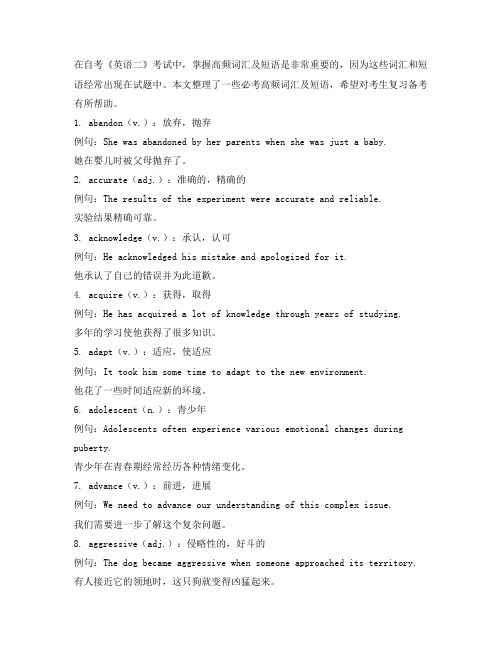
在自考《英语二》考试中,掌握高频词汇及短语是非常重要的,因为这些词汇和短语经常出现在试题中。
本文整理了一些必考高频词汇及短语,希望对考生复习备考有所帮助。
1. abandon(v.):放弃,抛弃例句:She was abandoned by her parents when she was just a baby.她在婴儿时被父母抛弃了。
2. accurate(adj.):准确的,精确的例句:The results of the experiment were accurate and reliable.实验结果精确可靠。
3. acknowledge(v.):承认,认可例句:He acknowledged his mistake and apologized for it.他承认了自己的错误并为此道歉。
4. acquire(v.):获得,取得例句:He has acquired a lot of knowledge through years of studying.多年的学习使他获得了很多知识。
5. adapt(v.):适应,使适应例句:It took him some time to adapt to the new environment.他花了一些时间适应新的环境。
6. adolescent(n.):青少年例句:Adolescents often experience various emotional changes during puberty.青少年在青春期经常经历各种情绪变化。
7. advance(v.):前进,进展例句:We need to advance our understanding of this complex issue.我们需要进一步了解这个复杂问题。
8. aggressive(adj.):侵略性的,好斗的例句:The dog became aggressive when someone approached its territory. 有人接近它的领地时,这只狗就变得凶猛起来。
2023年全国硕士研究生考试考研英语二试题真题(含答案)
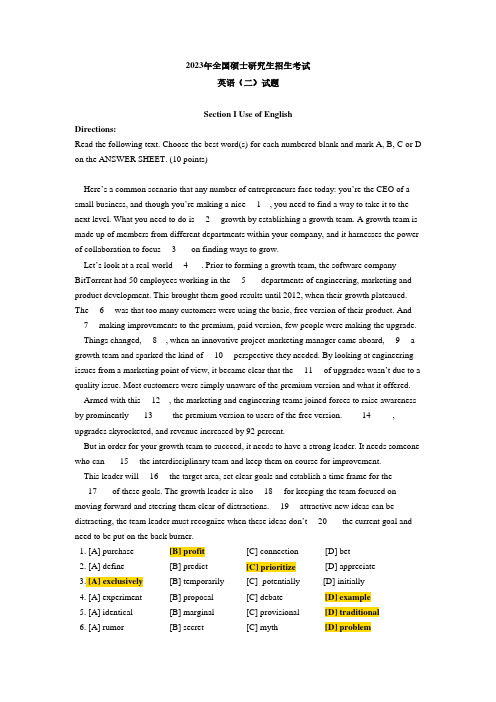
2023年全国硕士研究生招生考试英语(二)试题Section I Use of EnglishDirections:Read the following text. Choose the best word(s) for each numbered blank and mark A, B, C or D on the ANSWER SHEET. (10 points)Here’s a common scenario that any number of entrepreneurs face today: you’re the CEO of a small business, and though you’re making a nice __1__, you need to find a way to take it to the next level. What you need to do is __2__ growth by establishing a growth team. A growth team is made up of members from different departments within your company, and it harnesses the power of collaboration to focus __3___ on finding ways to grow.Let’s look at a real-world __4___. Prior to forming a growth team, the software company BitTorrent had 50 employees working in the __5___ departments of engineering, marketing and product development. This brought them good results until 2012, when their growth plateaued. The __6__ was that too many customers were using the basic, free version of their product. And __7__ making improvements to the premium, paid version, few people were making the upgrade. Things changed, __8__, when an innovative project-marketing manager came aboard, __9__ a growth team and sparked the kind of __10__ perspective they needed. By looking at engineering issues from a marketing point of view, it became clear that the __11__ of upgrades wasn’t due to a quality issue. Most customers were simply unaware of the premium version and what it offered. Armed with this __12__, the marketing and engineering teams joined forces to raise awareness by prominently ___13____ the premium version to users of the free version. ____14_____, upgrades skyrocketed, and revenue increased by 92 percent.But in order for your growth team to succeed, it needs to have a strong leader. It needs someone who can ___15__ the interdisciplinary team and keep them on course for improvement.This leader will __16__ the target area, set clear goals and establish a time frame for the___17___ of these goals. The growth leader is also __18__ for keeping the team focused on moving forward and steering them clear of distractions. __19__ attractive new ideas can be distracting, the team leader must recognize when these ideas don’t __20___ the current goal and need to be put on the back burner.1.[A] purchase[B]profit[C]connection[D]bet2.[A] define[B]predict[C]prioritize[D]appreciate3.[A] exclusively[B]temporarily[C]potentially[D]initially4.[A] experiment[B]proposal[C]debate[D]example5.[A] identical[B]marginal[C]provisional[D]traditional6.[A] rumor[B]secret[C]myth[D]problem7. [A] despite[B] unlike [C] through [D] besides8. [A] moreover [B] however[C] therefore [D] again9. [A] inspected [B] created[C] expanded [D] reformed10. [A] cultural [B] objective [C] fresh [D] personal11. [A] end [B] burden [C] lack[D] decrease12. [A] policy [B] suggestion [C] purpose [D] insight13. [A] contributing [B] allocating [C] promoting[D] transforming14. [A] as a result[B] at any rate [C] by the way [D] in a sense15. [A] unite[B] finance [C] follow [D] choose16. [A] share [B] identify[C] divide [D] broaden17.[A] announcement [B] assessment [C] adjustment [D]accomplishment18. [A] famous [B] responsible[C] available [D] respective19. [A] before [B] once [C] while[D] unless20. [A] serve[B] limit [C] summarize [D] alterSection II Reading ComprehensionPart ADirections:Read the following four texts. Answer the questions after each text by Choosing A, B, C or D. Mark your answers on the ANSWER SHEET. (40 points)Text 1In the quest for the perfect lawn, homeowners across the country are taking a shortcut — and it is the environment that is paying the price. About eight million square metres of plastic grass is sold each year but opposition has now spread to the highest gardening circles.The Chelsea Flower Show has banned fake grass from this year’s event, declaring it to be not part of its ethos. The Royal Horticultural Society (RHS), which runs the annual show in west London, says it has introduced the ban because of the damage plastic grass does to the environment and biodiversity.Ed Horne, of the RHS, said: “We launched our sustainability strategy last year and fake grass is just not in line with our ethos and views on plastic. We recommend using real grass because of its environmental benefits, which include supporting wildlife, mitigating flooding and cooling the environment.”The RHS’s decision comes as campaigners try to raise awareness of the problems fake grass causes. A Twitter account called Shit Lawns, which claims to “cut through the greenwash” of artificial grass, already has more than 20,000 followers. It is trying to encourage people to sign two petitions, one calling for a ban on the sale of plastic grass and another calling for an “ecological damage” tax on such lawns. They have gathered 7,260 and 11,272 signatures.However, supporters of fake grass point out that there is also an environmental impact with natural lawns, which need mowing and therefore usually consume electricity or petrol. The industry also points out that real grass requires considerable amounts of water, weed killer or other treatments and that people who lay fake grass tend to use their garden more. The industry also claims that people who lay fake grass spend an average of £500 on trees or shrubs for their garden, which provides habitat for insects.In response to another petition last year about banning fake lawns, which gathered 30,000 signatures, the government responded that it has “no plans to ban the use of artificial grass”.It added: “We prefer to help people and organizations make the right choice rather than legislating on such matters. However, the use of artificial grass must comply with the legal and policy safeguards in place to protect biodiversity and ensure sustainable drainage, while measures such as the strengthened biodiversity duty should serve to encourage public authorities to consider sustainable alternatives.”21. The RHS thinks that plastic grass __________.[A] is harmful to the environment[B] is a hot topic in gardening circles[C] is overpraised in the annual show[D] is ruining the view of west London22. The petitions mentioned in para.3 reveal the campaigner's ________.[A] disappointment with the RHS[B] resistance to fake grass use[C] anger over the proposed tax[D] concern above real grass supply23. In para 4, supporters of fake grass point out that_________.[A] the necessity to lower the costs of fake grass[B] the disadvantages of growing real grass[C] the way to take care of artificial lawns[D] the challenges of insect habitat protection24. What would the government do with regard to artificial grass?[A] urge legislation to restrict its use[B] take measures to guarantee its quality[C] remind its users to obey existing rules[D] replace it with sustainable alternatives25. It can be learned from the text that fake grass ________ .[A] is being improved continuously[B] has been a market share decline[C] is becoming affordable[D] has been a controversial productText 2It’s easy to dismiss as absurd the Trump administration’s ideas for plugging the chronic funding gap of our national parks. Can anyone really think it’s a good idea to allow Amazon deliveries to your tent in Yosemite or food trucks to line up under the redwood trees at Sequoia National Park? But the administration is right about one thing: U.S. national parks are in crisis. Collectively, they have a maintenance backlog of more than $12 billion. Roads, trails, restrooms, visitor centers and other infrastructure are crumbling.But privatizing and commercializing the campgrounds would not be the panacea that the Interior Department’s Outdoor Advisory Committee would have us believe. Campgrounds are a tiny portion of the overall infrastructure backlog, and concessionaires in the parks hand over, on average, only about 5% of their revenues to the National Park Service.Moreover, increased privatization would certainly undercut one of the major reasons why 300 million visitors come to the parks each year: to enjoy nature and get a respite from the commercial drumbeat that overwhelms daily life.The real problem is that the parks have been chronically starved of funding. We conducted a comprehensive survey examining how U.S. residents view their national parks, and we found that Americans place a very high value on them — whether or not they actually visit them. The peer-reviewed economic survey of 700 U.S. taxpayers, conducted by mail and internet, also found that people would be willing to pay a significant amount of money to make sure the parks and their programs are kept intact. Some 81% of respondents said they would be willing to pay additional taxes for the next 10 years to avoid any cuts to the national parks.The national parks provide great value to U.S. residents both as places to escape and as symbols of nature. On top of this, they produce value from their extensive educational programs, their positive impact on the climate through carbon sequestration, their contribution to our cultural and artistic life, and of course through tourism. The parks also help keep America’s past alive, working with thousands of local jurisdictions around the country to protect historical sites — including Ellis Island and Gettysburg — and to bring the stories of these places to life.The parks do all this on a shoestring. Congress allocates only $3 billion a year to the national park system — an amount that has been flat since 2001 (in inflation-adjusted dollars) with the exception of a onetime boost in 2009 as part of the Obama stimulus package. Meanwhile, the number of annual visitors has increased by more than 50% since 1980, and now stands at 330 million visitors per year.26. What problem are U.S. national parks faced with?[A] decline of business profits[B] inadequate commercialization[C] lack of transportation services[D] poorly maintained infrastructure27. Increased privatization of the campground may_______?[A] spoil visitor experience[B] help preserve nature[C] bring operational pressure[D] boost visits to parks28. According to para.5, most respondents in the survey would ______?[A] go to the national parks on a regular basis[B] advocate a bigger budget for the national parks[C] pay extra for the national parks[D] support the national parks' recent reforms29. The national parks are valuable in that they________[A] lead the way in tourism[B] have historical significance[C] sponsor research on climate[D] provide an income for locals30. It can be concluded from the text that the national park system _______[A] is able to cope with shortages[B] is able to meet visitors' demand[C] is in need of a new pricing policy[D] is in need of a funding increaseText 3The Internet may be changing merely what we remember, not our capacity to do so, suggests Columbia University psychology professor Betsy Sparrow. In 201, Sparrow led a study in which participants were asked to record 40 facts in a computer ("an ostrich's eye is bigger than its brain, for example). Half of the participants were told the information would be erased, while the other half were told it would be saved. Guess what? The latter group made no effort to recall the information when quizzed on it later, because they knew they could find it on their computers. In the same study, a group was asked to remember their information and the folders it was stored in. They didn't remember their information. But they remembered how to find the folders. In other words, human memory is not deteriorating but "adapting to new communications technology," Sparrow says.In a very practical way, the Internet is becoming an external hard drive for our memories, a process known as "cognitive offloading." "Traditionally, this role was fulfilled by data banks, libraries, and other humans. Your father may never remember birthdays because your mother does, for instance. Some worry that this is having a destructive effect on society, but Sparrow sees an upside. Perhaps, she suggests, the trend will change our approach to learning from a focus on individual facts and memorization to an emphasis on more conceptual thinking -something that isnot available on the Internet." I personally have never seen all that much intellectual value in memorizing things," Sparrow says, adding that we haven't lost our ability to do it.Still, other experts say it's too soon to understand how the Internet affects our brains. There is no experimental evidence showing that it interferes with our ability to focus, for instance, wrote psychologists Christopher Chabris and Daniel Simons. And surfing the web exercised the brain more than reading did among computer-save older adults in a 2008 study involving 24 participants at the Semel Institute for Neuroscience and Human Behavior at the University of California, Los Angeles.There may be costs associated with our increased reliance on the Internet but I'd have to imagine that overall the benefits are going to outweigh those costs, observes psychology professor Benjamin Storm:'It seems pretty clear that memory is changing, but is it changing for the better? At this point, we don't know.31.Sparrow's study shows that with the Internet, the human brain will ________[A] analyze information in detail[B] collect information efficiently[C] switch its focus of memory[D] extend its memory duration32.The process of "cognitive offloading"________[A] helps us identify false information[B] keeps our memory from failing[C] enables us to classify trivial facts[D] lessens our memory burdens33.Which of the following would Sparrow support about the Internet?[A] It may reform our way of learning[B] It may impact our society negatively[C] It may enhance our adaptability to technology[D] It may interfere with our conceptual thinking34. It is indicated in Para 3 that how the Internet affects our brains?[A] requires further academic research[B] is most studies in older adults[C] is reflected in our reading speed[D] depends on our web-surfing habits35. Neither Sparrow nor Storm would agree that ________[A] our reliance on the Internet will be costly[B] the Internet is weakening our memory[C] memory exercise is a must for our brain[D] our ability to focus decline with ageText 4Teenagers are paradoxical. That's a mild and detached way of saying something that parents often express with considerably stronger language. But the paradox is scientific as well as personal. In adolescence, helpless and dependent children who have relied on grown-ups for just about everything become independent people who can take care of themselves and help each other. At the same time, once cheerful and compliant children become rebellious teenage risk-takers, often to the point of self-destruction. Accidental deaths go up dramatically in adolescence.A new study published in the journal Child Development, by Eveline Crone of the University of Leiden and colleagues, suggests that the positive and negative sides of teenagers go hand in hand. The study is part of a new wave of thinking about adolescence. For a long time, scientists and policymakers concentrated on the idea that teenagers were a problem that needed to be solved. The new work emphasizes that adolescence is a time of opportunity as well as risk.The researchers studied “prosocial” and rebellious traits in more than 200 children and young adults, ranging from 11 to 28 years old. The participants filled out questionnaires about how often they did things that were altruistic and positive, like sacrificing their own interests to help a friend, or rebellious and negative, like getting drunk or staying out late. Other studies have shown that rebellious behavior increases as you become a teenager and then fades away as you grow older. But the new study shows that, interestingly, the same pattern holds for prosocial behavior. Teenagers were more likely than younger children or adults to report that they did things like unselfishly help a friend.Most significantly, there was a positive correlation between prosociality and rebelliousness. The teenagers who were more rebellious were also more likely to help others. The good and bad sides of adolescence seem to develop together.Is there some common factor that underlies these apparently contradictory developments? One idea is that teenage behavior is related to what researchers call “reward sensitivity.”Decision-making always involves balancing rewards and risks, benefits and costs. “Reward sensitivity” measures how much reward it takes to outweigh risk.Teenagers are particularly sensitive to social rewards—winning the game, impressing a new friend, getting that boy to notice you. Reward sensitivity, like prosocial behavior and risk-taking, seems to go up in adolescence and then down again as we age. Somehow, when you hit 30, the chance that something exciting and new will happen at that party just doesn’t seem to outweigh the effort of getting up off the couch.36.According to Paragraph 1, children growing into adolescence tend to ______[A] develop opposite personality traits[B] see the world in an unreasonable way[C] have fond memories of the past[D] show attention for their parents37.It can be learned from Paragraph 2 that Crone's study[A] explores teenagers' social resposibilities[B] examines teenagers' emotional problems[C] provides a new insight into adolescence[D] highlight negative adolescent behaviour38.What does Crone's study find about prosocial behavior?[A] It results from the wish to cooperate[B] It is cultivated through education[C] It is subject to family influence[D] It tends to peak in adolescence39.It can be learned from the last two paragraphs that teenagers ______[A] overstress their influence on others[B] care a lot about social recognition[C] become anxious about their future[D] endeavor to live a joyful life40. What is the text mainly about?[A] why teenagers are self-contradictory[B] why teenagers are risk-sensitive[C] How teenagers develop prosociality[D] How teenagers become independentPart BDirections:Read the following text and answer the questions by choosing the most suitable subheading from the list A-G for each of the numbered paragraphs (41-45). There are two extra subheadings which you do not need to use. Mark your answers on the ANSWER SHEET. (10 points)Net-zero rules set to send cost of new homes and extensions soaringNew building regulations aimed at improving energy efficiency are set to increase the price of new homes, as well as those of extensions and loft conversions on existing ones.The rules, which came into effect on Wednesday in England, are part of government plans to reduce the UK’s carbon emissions to net zero by 2050. They set new standards for ventilation, energy efficiency and heating, and state that new residential buildings must have charging points for electric vehicles.The moves are the most significant change to building regulations in years, and industry experts say they will inevitably lead to higher prices at a time when a shortage of materials and high labour costs is already driving up bills.Brian Berry, chief executive of the Federation of Master Builders, a trade group for small and medium-sized builders, says the measures will require new materials, testing methods, productsand systems to be installed. “All this comes at an increased cost during a time when prices are already sky high. Inevitably, consumers will have to pay more,” he says.Gareth Belsham, of surveyors Naismiths, says people who are upgrading, or extending their home, will be directly affected.“The biggest changes relate to heating and insulation,” he says. “There are new rules concerning the amount of glazing used in extensions, and any new windows or doors must be highly insulated.”Windows and doors will have to adhere to higher standards, while there are new limits on the amount of glazing you can have to reduce unwanted heat from the sun.Thomas Goodman, of MyJobQuote, a site which sources quotes, says this will bring in new restrictions for extensions.“Glazing on windows, doors and rooflights must cover no more than 25% of the floor area to prevent heat loss, ” he says.As the rules came into effect last Wednesday, property developers were rushing to file plans just before the deadline. Any plans submitted before that date are considered to be under the previous rules, and can go ahead as long as work starts before 15 June next year.Builders which have costed projects, but have not filed the paperwork, may need to go back and submit fresh estimates, says Marcus Jefford of Build Aviator, which prices projects.As the changes are aimed to make homes more energy efficient, they will eventually drive down heating bills. But in the short-term homeowners are likely to face higher costs for work. Materials prices are already up 25% in the last two years, according to figures from the Construction Products Association. How much overall prices will increase as a result of the rule changes is not clear. “While admirable in their intentions, they will add to the cost of housebuilding at a time when many already feel that they are priced out of homeownership,” says Rolande. “An average extension will probably see around £3,000 additional cost thanks to the new regs.”John Kelly, a construction lawyer at Freeths law firm, believes prices will eventually come down. But not in the immediate future. “As the marketplace adapts to the new requirements, and the technologies that support them, the scaling up of these technologies will eventually bring costs down, but in the short term, we will all have to pay the price of the necessary transition,” he says. However, the long-term effects of the changes will be more comfortable and energy-efficient homes, adds Andrew Mellor. “Homeowners will probably recoup that cost over time in energy bill savings. It will obviously be very volatile at the moment, but they will have that benefit over time.”[A] The rise of home prices is a temporarymatter.41.Brian Berry [B] Builders possibly need to submit newestimates of their projects.42.Gareth Belsham [C] There will be specific limits on homeextensions to prevent heat loss43.Marcus Jefford [D] The new rules will take home price to aneven higher lever.44.John Kelly [E] Many people feel that home prices arealready beyond what they can afford45.Andrew Mellor [F] The new rules will affect people whosehome extensions include new windows ordoors.[G] The rule changes will benefit homeownerseventually.【参考答案】41.D42.F43.B44.A45.GSection III Translation46. Directions:Translate following text into Chinese. Write your translation on the ANSWER SHEET. (15 points)In the late 18th century, William Wordsworth became famous for his poems about nature. And he was one of the founders of a movement called Romanticism, which celebrated the wonders of the natural world.Poetry is powerful. Its energy and rhythm can capture a reader, transport them to another world and make them see things differently. Through carefully selected words and phrases, poems can be dramatic, funny, beautiful, moving and inspiring.No one knows for sure when poetry began but it has been around for thousands of years, even before people could write. It was a way to tell stories and pass down history. It is closely related to song and even when written it is usually created to be performed out loud. Poems really cometo life when they are recited. This can also help with understanding them too, because the rhythm and sounds of the words become clearer.【参考译文】18世纪晚期,威廉·华兹华斯因其关于自然的诗歌而闻名。
山西自考英语二试题及答案

山西自考英语二试题及答案一、阅读理解(共20分,每题4分)阅读下列短文,然后根据短文内容回答问题。
A篇In the past few years, there has been a significant increase in the number of people who work from home. This trend has been driven by advancements in technology, which have made it easier for employees to connect with their colleagues and complete their tasks remotely. Working from home offers several benefits, including a better work-life balance and reduced commuting time. However, it also presents challenges such as isolation and the need for self-discipline.1. What is the main reason for the increase in remote work?a) Better work-life balanceb) Technological advancementsc) Reduced commuting timed) Isolation2. What benefits are mentioned in the passage for working from home?a) Increased productivityb) Better work-life balancec) More frequent promotionsd) Higher salaries3. What challenges does remote work present?a) Technological issuesb) Isolationc) Office politicsd) Long working hoursB篇The concept of lifelong learning has gained popularity in recent years. It emphasizes the importance of continuous education and skill development throughout one's life. Lifelong learning can take various forms, from formal education to self-directed learning and online courses. The benefits of lifelong learning are numerous, including personal growth, increased employability, and the ability to adapt to changes in the job market.4. What is the main idea of lifelong learning?a) The importance of formal educationb) Continuous education throughout lifec) The need for online coursesd) The benefits of self-directed learning5. What are some forms that lifelong learning can take?a) Formal education onlyb) Self-directed learning and online coursesc) Job promotions and raisesd) Networking and professional events6. What are the benefits of lifelong learning?a) Personal growth and adaptabilityb) Higher starting salariesc) Increased job securityd) Access to better job titles二、词汇与语法(共30分,每题3分)7. The company has been ________ for its innovative approach to problem-solving.a) criticizedb) recognizedc) ignoredd) forgotten8. Despite the heavy rain, the construction work was not________.a) delayedb) advancedc) canceledd) resumed9. She has a ________ knowledge of French, which allows her to communicate effectively with French speakers.a) limitedb) profoundc) superficiald) basic10. The new policy will come into ________ next month.a) actionb) effectc) forced) operation三、完形填空(共20分,每题2分)阅读下面的短文,从短文后各题所给的四个选项中,选出可以填入空白处的最佳选项。
2023年10月自考英语二
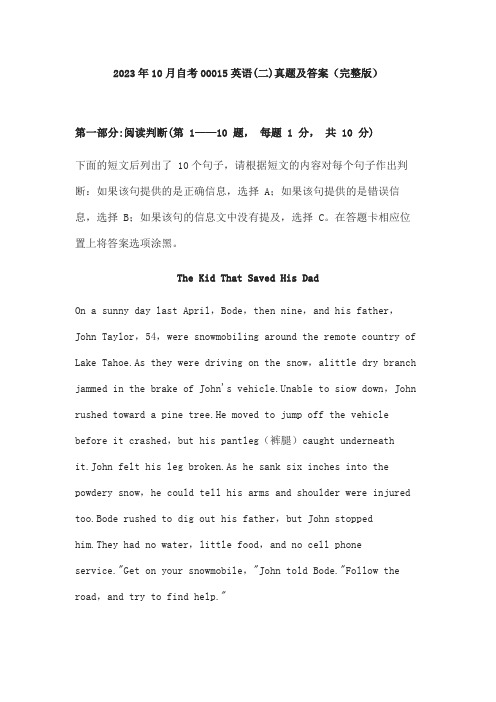
2023年10月自考00015英语(二)真题及答案(完整版)第一部分:阅读判断(第 1——10 题,每题 1 分,共 10 分)下面的短文后列出了 10个句子,请根据短文的内容对每个句子作出判断:如果该句提供的是正确信息,选择 A;如果该句提供的是错误信息,选择 B;如果该句的信息文中没有提及,选择 C。
在答题卡相应位置上将答案选项涂黑。
The Kid That Saved His DadOn a sunny day last April,Bode,then nine,and his father,John Taylor,54,were snowmobiling around the remote country of Lake Tahoe.As they were driving on the snow,alittle dry branch jammed in the brake of John's vehicle.Unable to siow down,John rushed toward a pine tree.He moved to jump off the vehicle before it crashed,but his pantleg(裤腿)caught underneathit.John felt his leg broken.As he sank six inches into the powdery snow,he could tell his arms and shoulder were injured too.Bode rushed to dig out his father,but John stoppedhim.They had no water,little food,and no cell phone service."Get on your snowmobile,"John told Bode."Follow the road,and try to find help."After a 20-minute ride,Bode spotted a tour group and asked the guide to radio for help.The rescuers quickly appeared on the scene.And Bode led them through the white wilderness to his dad,who was pale and in pain.While they were waiting for a plane to send John to the nearest hospital,the rescuers quickly stabilized his leg.An hour later,he received surgery for the broken leg and internal bleeding.Today, John's leg has healed enough for him to take Bode out on dirt bikes. Father and son now carry extra devices on their trips, including a two-way radio with an emergency button. "I'm still a little afraid to go out on a snowmobile,"says Bode. "But I'm starting to feel better about it."Tisha Shaw, Bode's mother, says her son's courage and quick thinking have led her to treat him as more of an adult. Shelets him stay up later at night because "I trust his judgment,"she says.1. Bode and his father went snowmobiling last April.A. TrueB. FalseC. Not Given2. Bode's snowmobile broke down on the way.A. TrueB. FalseC. Not Given3. John had an accident and injured himself.A. TrueB. FalseC. Not Given4. John told his son to make a call for help.A. TrueB. FalseC. Not Given5. A tour guide helped Bode to contact the rescuers.A. TrueB. FalseC. Not Given6. The rescuers stabilized John's leg on the plane.A. TrueB. FalseC. Not Given7. John's surgery lasted for a long time.A. TrueB. FalseC. Not Given8. Bode and his father are better equipped for their trips now.A. TrueB. FalseC. Not Given9. Bode learned to use the two-way radio quickly.A. TrueB. FalseC. Not Given10. Tisha Shaw has great praise for her son.A. TrueB. FalseC. Not Given第二部分:阅读选择(第 11——15 题,每题 2 分,共 10 分)阅读下面短文,请从短文后所给各题的 4 个选项(A、B、C、D)中选出1 个最佳选项,并在答题卡相应位置上将该项涂黑。
2021年英语二(完整版)

Yours sincerely, Li Ming
This bar chart demonstrates various manners a city’s residents adopt in doing physical activities. Specifically, residents who tend to do exercise by themselves occupy the largest portion, up to 54.3%, which is closely followed by the proportion of people working out with friends with a percentage of 47.7%, By contrast, citizens who exercise with families or in a group only make up 23.9% and 15.8%, respectively.
Topics like this can always attract a lot of attention and spur considerable discussions. Therefore, we are wondering whether you are interested in this topic and willing to join us. I’m sure we can have a meaningful and joyful evening together.
英语二评分标准
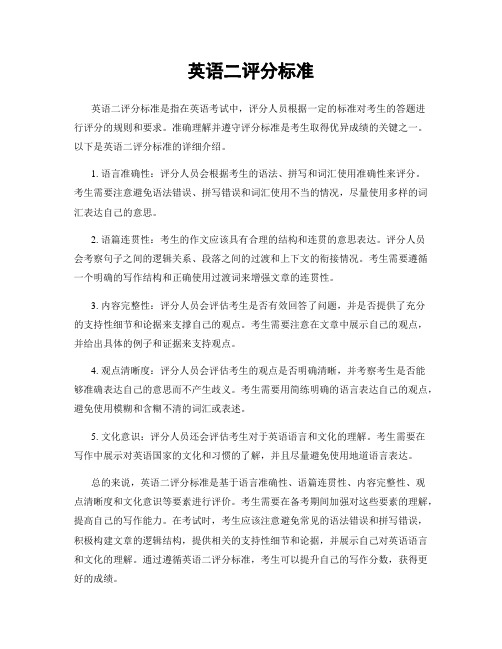
英语二评分标准英语二评分标准是指在英语考试中,评分人员根据一定的标准对考生的答题进行评分的规则和要求。
准确理解并遵守评分标准是考生取得优异成绩的关键之一。
以下是英语二评分标准的详细介绍。
1. 语言准确性:评分人员会根据考生的语法、拼写和词汇使用准确性来评分。
考生需要注意避免语法错误、拼写错误和词汇使用不当的情况,尽量使用多样的词汇表达自己的意思。
2. 语篇连贯性:考生的作文应该具有合理的结构和连贯的意思表达。
评分人员会考察句子之间的逻辑关系、段落之间的过渡和上下文的衔接情况。
考生需要遵循一个明确的写作结构和正确使用过渡词来增强文章的连贯性。
3. 内容完整性:评分人员会评估考生是否有效回答了问题,并是否提供了充分的支持性细节和论据来支撑自己的观点。
考生需要注意在文章中展示自己的观点,并给出具体的例子和证据来支持观点。
4. 观点清晰度:评分人员会评估考生的观点是否明确清晰,并考察考生是否能够准确表达自己的意思而不产生歧义。
考生需要用简练明确的语言表达自己的观点,避免使用模糊和含糊不清的词汇或表述。
5. 文化意识:评分人员还会评估考生对于英语语言和文化的理解。
考生需要在写作中展示对英语国家的文化和习惯的了解,并且尽量避免使用地道语言表达。
总的来说,英语二评分标准是基于语言准确性、语篇连贯性、内容完整性、观点清晰度和文化意识等要素进行评价。
考生需要在备考期间加强对这些要素的理解,提高自己的写作能力。
在考试时,考生应该注意避免常见的语法错误和拼写错误,积极构建文章的逻辑结构,提供相关的支持性细节和论据,并展示自己对英语语言和文化的理解。
通过遵循英语二评分标准,考生可以提升自己的写作分数,获得更好的成绩。
自考英语二历年真题及答案(全)
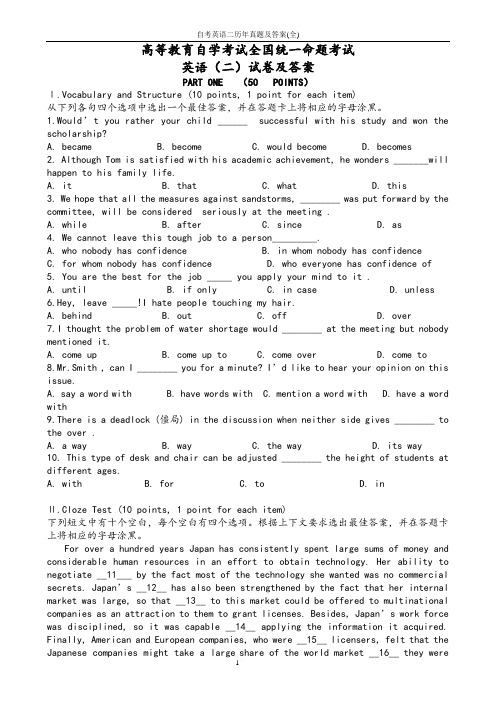
高等教育自学考试全国统一命题考试英语(二)试卷及答案PART ONE (50 POINTS)Ⅰ.Vocabulary and Structure (10 points, 1 point for each item)从下列各句四个选项中选出一个最佳答案,并在答题卡上将相应的字母涂黑。
1.Would’t you rather your child ______ successful with his study and won the scholarship?A. becameB. becomeC. would becomeD. becomes2. Although Tom is satisfied with his academic achievement, he wonders _______will happen to his family life.A. itB. thatC. whatD. this3. We hope that all the measures against sandstorms, ________ was put forward by the committee, will be considered seriously at the meeting .A. whileB. afterC. sinceD. as4. We cannot leave this tough job to a person_________.A. who nobody has confidenceB. in whom nobody has confidenceC. for whom nobody has confidenceD. who everyone has confidence of5. You are the best for the job _____ you apply your mind to it .A. untilB. if onlyC. in caseD. unless6.Hey, leave _____!I hate people touching my hair.A. behindB. outC. offD. over7.I thought the problem of water shortage would ________ at the meeting but nobody mentioned it.A. come upB. come up toC. come overD. come to8.Mr.Smith , can I ________ you for a minute? I’d like to hear your opinion on this issue.A. say a word withB. have words withC. mention a word withD. have a word with9.There is a deadlock (僵局) in the discussion when neither side gives ________ to the over .A. a wayB. wayC. the wayD. its way10. This type of desk and chair can be adjusted ________ the height of students at different ages.A. withB. forC. toD. inⅡ.Cloze Test (10 points, 1 point for each item)下列短文中有十个空白,每个空白有四个选项。
2022考研英语二真题+答案

2022年全国硕士研究生入学统一考试英语(二)试题SectionⅠUse of EnglishDirections:Read the following text.Choose the best word(s)for each numbered blank and mark A,B,C or D on the ANSWER SHEET.(10points)Harlan Coben believes that if you’re a writer,you'll find the time;and that if you can’t find the time,then writing isn’t a priority and you’re not a writer.For him,writing is1job—a job like any other.He has2it with plumbing,pointing out that a plumber doesn’t wake up and say that he can’t work with pipes today.3,like most writers these days,you’re holding down a job to pay the bills,it’s not4to find the time to write.But it’s not impossible.It requires determination and single-mindedness.5that most bestselling authors began writing when they were doing other things to earn a living.And today,even writers who are fairly6often have to do other work to7their writing income.As Harlan Coben has suggested,it’s a8of priorities.To make writing a priority,you’ll have to9some of your day-to-day activities and some things you really enjoy.Depending on your10and your lifestyle,that might mean spending less time watching television or listening to music,though some people can write11they listen to music.You might have to12the amount of exercise or sport you do.You'll have to make social media an 13activity rather than a daily,time-consuming14.There’ll probably have to be less socializing with your friends and less time with your family.It’s a15learning curve,and it won’t always make you popular.There’s just one thing you should try to keep at least some time for,16your writing—and that’s reading. Any writer needs to read as much and as widely as they can;it’s the one17supporter—something you can’t do without.Time is finite,the older you get,the18it seems to go.We need to use it as carefully and as19as we can. That means prioritizing out activities so that we spend most time on the things we really want to do.If you are a writer,that means—20—writing.1.[A]difficult[B]normal[C]steady[D]pleasant2.[A]combined[B]compared[C]confused[D]confronted3.[A]If[B]Through[C]Once[D]Unless4.[A]enough[B]strange[C]wrong[D]easy5.[A]Accept[B]Explain[C]Remember[D]Suppose6.[A]well-known[B]well-advised[C]well-informed[D]well-chosen7.[A]donate[B]generate[C]supplement[D]calculate8.[A]cause[B]purpose[C]question[D]condition9.[A]highlight[B]sacrifice[C]continue[D]explore10.[A]relations[B]interests[C]memories[D]skills11.[A]until[B]because[C]while[D]before12.[A]put up with[B]make up for[C]hang on to[D]cut down on13.[A]intelligent[B]occasional[C]intensive[D]emotional14.[A]habit[B]test[C]decision[D]plan15.[A]tough[B]gentle[C]rapid[D]funny16.[A]in place of[B]in charge of[C]in response to[D]in addition to17.[A]indispensable[B]innovative[C]invisible[D]instant18.[A]duller[B]harder[C]quieter[D]quicker19.[A]peacefully[B]generously[C]productively[D]gratefully20.[A]at most[B]in turn[C]on average[D]above allSectionⅡReading ComprehensionPart ADirections:Read the following four texts.Answer the questions below each text by choosing A,B,C or D. Mark your answers on the ANSWER SHEET.(40points)TEXT1On a recent sunny day,13,000chickens roam over Larry Brown’s40windswept acres in Shiner,Texas. Some rest in the shade of a parked car.Others drink water with the cows.This all seems random,but it’s by design, part of what the$6.1billion U.S.egg industry bets will be its next big thing:climate-friendly eggs.These eggs,which are making their debut now on shelves for as much as$8a dozen,are still labeled organic and animal-friendly,but they’re also from birds that live on farms using regenerative agriculture-special techniques to cultivate rich soils that can trap greenhouse gases.Such eggs could be marketed as helping to fight climate change.“I’m excited about our progress,”says Brown,who harvests eggs for Denver-based NestFresh Eggs and is adding more cover crops that draw worms and crickets for the chickens to eat.The birds’waste then fertilizes fields.Such improvements“allow our hens to forage for higher-quality natural feed that will be good for the land, the hens,and the eggs that we supply to our customers.”The egg industry’s push is the first major test of whether animal products from regenerative farms can become the next premium offering.In barely more than a decade,organic eggs went from being dismissed as a niche product in natural foods stores to being sold at Walmart.More recently there were similar doubts about probiotics and plant-based meats,but both have exploded into major supermarket categories.If the sustainable-egg rollout is successful,it could open the floodgates for regenerative beef,broccoli,and beyond.Regenerative products could be a hard sell,because the concept is tough to define quickly,says Julie Stanton, associate professor of agricultural economics at Pennsylvania State University Brandywine.Such farming also brings minimal,if any,improvement to the food products(though some producers say their eggs have more protein).The industry is betting that the same consumers paying more for premium attributes such as free-range,non-GMO,and pasture-raised eggs will embrace sustainability.Surveys show that younger generations are moreconcerned about climate change,and some of the success of plant-based meat can be chalked up to shoppers wanting to signal their desire to protect the environment.Young adults“really care about the planet,”says John Brunnquell,president of Egg Innovations.“They are absolutely altering the food chain beyond what I think even they understand what they’re doing.”21.The climate-friendly eggs are produced.[A]at a considerably low cost[B]at the demand of regular shoppers[C]as a replacement for organic eggs[D]on specially designed farmsrry Brown is excited about his progress in.[A]reducing the damage of worms[B]accelerating the disposal of uses[C]creating a sustainable system.[D]attracting customers to his products23.The example of organic eggs is used in the paragraph4to suggest.[A]the doubts to over natural feeds[B]the setbacks in the eggs industry[C]the potential of regenerative products[D]the promotional success of super markets24.It can be learned from the last paragraph that young people.[A]are reluctant to change their diet[B]are likely to buy climate-friendly eggs[C]are curious about new food[D]are amazed at agricultural advances25.John Brunnquell would disagree with Julie Stanton over regenerative products’.[A]markets prospects[B]standard definition[C]market prospect[D]moral implicationTEXT2More Americans are opting to work well into the retirement,a growing trend that threatens to upend the old workforce model.One in three Americans who are at least40have or plan to have a job in retirement to prepare for a longer life,according to a survey conducted by Harris Poll for TD Ameritrade.Even more surprising is that more than half of unretirees—those who plan to work in retirement or went back to work after retiring—said they would be employed in their later years even if they had enough money to settle down,the survey showed.Financial needs aren’t the only culprit for the“unretirement”trend.Other reasons,according to the study,include personal fulfillment such as staying mentally fit,preventing boredom or avoiding depression.About72% of“unretire”respondents said that they would return to work once retired to keep mentally fit while59%said it would be tied to making ends meet.Can Congress save the economy?Fed chair says“US debt is‘on unsustainable path’”.Auto industry is still a boys’club at the top despite GM CEO Mary Barrassuccess.“The concept of retirement is evolving,”said Christine Russell senior manager of retirement at TD Ameritrade.“It’s not just about finances.The value of work is also driving folks to continue working past retirement.”One reason for the change in retirement patterns:Americans are living longer.The share of the population65 and older was16%in2018,up3.2%from the prior year,according to the U.S.Census Bureau.That’s also up 30.2%since2010.Older Americans are also the fastest-growing segment of the U.S workforce,and boomers are expected to live longer than previous generations.The percentage of retirement-age people in the labor force has doubled over the past three decades.About20%of people65and older were in the workforce in February,up from an all-time low of10%in January1985,according to money manager United Income.Because of longer life spans,Americans are also boosting their savings to preserve their nest eggs,the TD Ameritrade study showed which surveyed2,000adults between40to79.Six in10“unretires'"are increasing their savings in anticipation of a longer life,according to the survey.Among the most popular ways they are doing this, the company said,is by reducing their overall expenses,securing life insurance or maximizing their contributions to retirement accounts.Seniors are living longer,but planning for the extended years is key.Unfortunately,many people who are opting to work in retirement are preparing to do so because they are worried about making ends meet in their later years,said Brent Weiss,a co-founder at Baltimore-based financial-planning firm Facet Wealth.He suggested that preretiree should speak with a financial adviser to set long-term financial goals.“The most challenging moments in life are getting married,starting a family and ultimately retiring.”Weiss said.“It’s not just a financial decision,but an emotional one.Many people believe they can’t retire."26.The survey conducted by Harris Poll indicates that.[A]over half of the retirees are physically fit for work[B]the old workforce is as active as the younger one[C]one in three Americans enjoy earlier retirement[D]more Americans are willing to work in retirement27.It can be inferred from Paragraph3that Americans tend to think that.[A]retirement may cause problems for them[B]boredom can be relieved after retirement[C]the mental health of retirees is overlooked[D]“unretirement”contributes to the economy28.Retirement patterns are changing partly due to.[A]labor shortage[B]population growth[C]longer life expectancy[D]rising living costs29.Many retirees are increasing their savings by.[A]investing more in stocks[B]taking up odd jobs[C]getting well-paid work[D]spending less30.With regard to retirement,Brent Weiss thinks that many people are.[A]unprepared[B]unafraid[C]disappointed[D]enthusiasticTEXT3We have all encountered them,in both our personal and professional lives.Think about the times you felt tricked or frustrated by a membership or subscription that had a seamless sign-up process but was later difficult to cancel.Something that should be simple and transparent can be complicated,intentionally or unintentionally,in ways that impair consumer choice.These are examples of dark patterns.First coined in2010by user experience expert Harry Brignull,”dark patterns”is a catch-all term for practices that manipulate user interfaces to influence the decision-making ability of users.Brignull identifies12 types of common dark patterns,ranging from misdirection and hidden costs to"roach motel”where a user experience seems easy and intuitive at the start,but turns difficult when the user tries to get out.In a2019study of53,000product pages and11,000websites,researchers found that about one in10 employs these design practices.Though widely prevalent,the concept of dark patterns is still not well understood. Business and nonprofit leaders should be aware of dark patterns and try to avoid the gray areas they engender.Where is the line between ethical,persuasive design and dark patterns?Businesses should engage in conversations with IT,compliance,risk,and legal teams to review their privacy,and include in the discussion the customer/user experience designers and coders responsible for the company’s user interface,as well as the marketers and advertisers responsible for sign-ups,checkout baskets pricing,and promotions.Any or all these teams can play a role in creating or avoiding"digital deception.”Lawmakers and regulators are slowly starting to address the ambiguity around dark patterns,most recently at the state level.In March,the California Attorney General announced the approval of additional regulations under the California Consumer Privacy Act(CCPA)that“ensure that consumers will not be confused or misled when seeking to exercise their data privacy rights.”The regulations aim to ban dark patterns—this means prohibiting companies from using"confusing language or unnecessary steps such as forcing them to click through multiple screens or listen to reasons why they shouldn’t opt out.”As more states consider promulgating additional regulations,there is a need for greater accountability from within the business community.Dark patterns also can be addressed on a self-regulatory basis,but only if organizations hold themselves accountable,not just to legal requirements but also to industry best practices and standards.31.It can be learned from the first two paragraphs that dark patterns_____[A]improve user experiences[B]leak user information for profit[C]undermine users’decision-making[D]remind users of hidden costs32.The2019study on dark patterns is mentioned to show______[A]their major flaws[B]their complex designs[C]their severe damage[D]their strong presence33.To handle digital deception,businesses should____[A]listen to customer feedback[B]talk with relevant teams[C]turn to independent agencies[D]rely on professional training34.The additional regulations under the CCPA are intended to_____[A]guide users through opt-out processes[B]protect consumers from being tricked[C]grant companies data privacy rights[D]restrict access to problematic content35.According to the last paragraph,a key to coping with dark patterns is______[A]new legal requirements[B]businesses'self-discipline[C]strict regulatory standards[D]consumers safety awarenessText4Although ethics classes are common around the world,scientists are unsure if their lessons can actually change behavior;evidence either way is weak,relying on contrived laboratory tests or sometimes unreliable self-reports.But a new study published in Cognition found that,in at least one real-world situation,a single ethics lesson may have had lasting effects.The researchers investigated one class session's impact on eating meat.They chose this particular behavior for three reasons,according to study co-author Eric Schwitzgebel,a philosopher at the University of California, Riverside:students’attitudes on the topic are variable and unstable,behavior is easily measurable,and ethics literature largely agrees that eating less meat is good because it reduces environmental harm and animal suffering. Half of the students in four large philosophy classes read an article on the ethics of factory-farmed meat, optionally watched an11-minute video on the topic and joined a50-minute discussion.The other half focused on charitable giving instead.Then,unknown to the students,the researchers studied their anonymized meal-card purchases for that semester-nearly14,000receipts for almost500students.Schwitzgebel predicted the intervention would have no effect;he had previously found that ethics Professorsdo not differ from other professors on a range of behaviors,including voting rates,blood donation and returning library books.But among student subjects who discussed meat ethics,meal purchases containing meat decreased from52to45percent-and this effect held steady for the study's duration of several weeks.Purchases from the other group remained at52percent.“That’s actually a pretty large effect for a pretty small intervention,”Schwitzgebel says.Psychologist Nina Strohminger at the University of Pennsylvania,who was not involved in the study,says she wants the effect to be real but cannot rule out some unknown confounding variable.And if real,she notes,it might be reversible by another nudge:“Easy come,easy go.”Schwitzgebel suspects the greatest impact came from social influence—classmates or teaching assistants leading the discussions may have shared their own vegetarianism,showing it as achievable or more common. Second,the video may have had an emotional impact.Least rousing,he thinks,was rational argument,although his co-authors say reason might play a bigger role.Now the researchers are probing the specific effects of teaching style,teaching assistants’eating habits and students'video exposure.Meanwhile,Schwitzgebel-who had predicted no effect-will be eating his words.36.Scientists generally believe that the effects of ethics classes are[A]hard to determine[B]narrowly interpreted[C]difficult to ignore[D]poorly summarized37.Which of the following is a reason for the researchers to study meat eating?[A]It is common among students.[B]It is a behavior easy to measure.[C]It is important to students’health[D]It is a hot topic in ethics classes.38.Eric Schwitzgebel’s previous findings suggest that ethics professors[A]are seldom critical of their students[B]are less sociable than other professors[C]are not sensitive to political issues[D]are not necessarily ethically better39.Nina Strohminger thinks that the effect of the intervention is[A]permanent[B]predictable[C]uncertain[D]unrepeatable40.Eric Schwitzgebel suspects that the students’change in behavior[A]can bring psychological benefits[B]can be analyzed statistically[C]is a result of multiple factors[D]is a sign of self-developmentPart BDirections:Read the following test and answer the questions by choosing the most suitable subtitles from the list A-G for each numbered paragraph(41-45).There are two extra subtitles which you do not need to use.Make your answers on the ANSWER SHEET.(10points)[A]Make it a habit[B]Don’t go it alone[C]Start low,go slow[D]Talk with your doctor[E]Listen to your body[F]Go through the motions[G]Round out your routineHow to get active again?Getting back into exercise can be a challenge in the best of times,but with gyms and in-person exercise classes off-limits to many people these days,it can be tricky to know where to start.And it’s important to get the right dose of activity.“Too much too soon either results in injury or burnout,”says Mary Yoke,PhD,a faculty member in the kinesiology department at Indiana University in Bloomington.The following simple strategies will help you return to exercise safely after a break.41._____________Don’t try to go back to what you were doing before your break.If you were walking3miles a day,playing 18holes of golf three times a week,or lifting10-pound dumbbells for three sets of10reps,reduce activity to½mile every other day,or nine holes of golf once a week with short walks on other days,or use5-pound dumbbells for one set of10reps.Increase time,distance,and intensity gradually.“This isn’t something you can do overnight,”say Keri L.Denay,MD,lead author of a recent American College of Sports Medicine advisory that encourages American to not overlook the benefits of activity during the pandemic.But you’ll reap benefits such as less anxiety and improved sleep right away.42._______________If you’re breathing too hard to talk in complete sentences,back off.If you feel good,go a little longer or faster.Feeling wiped out after a session?Go easier next time.And stay alert to serious symptoms,such as chest pain or pressure,severe shortness of breath or dizziness,or faintness,and seek medical attention immediately. 43.________________Consistency is the key to getting stronger and building endurance and stamina.Ten minutes of activity per day is a good start,says Marcus Jackovitz,DPT,a physical therapist at the University of Miami Hospital.All the experts we spoke with highly recommend walking because it’s the easiest,most accessible form of exercise. Although it can be a workout on its own,if your goal is to get back to Zumba classes,tennis,cycling,or any other activity,walking is also a great first step.44._________________Even if you can’t yet do a favorite activity,you can practice the moves.With or without a club or racket,swing like you’re hitting the ball.Paddle like you’re in a kayak or canoe.Mimic your favorite swimming strokes. The action will remind you of the joy the activity brought you and prime your muscles for when you can get out there again.45.____________________Exercising with others“can keep you accountable and make it more fun,so you’re more likely to do it again,”Jackovitz says.You can do activities such as golf and tennis or take a walk with others and still be socially distant. But when you can’t connect in person,consider using technology.Chat on the phone with a friend while you walk around your neighborhood.FaceTime with a relative as you strength train or stretch at home.You can also join a livestream or on-demand exercise class.Section III Translation46.Directions:Translate the following text from English into Chinese.Write your translation on ANSWER SHEET.(15 points)Although we try our best,sometimes our paintings rarely turn out as originally planned.Changes in the light, the limitations of your painting materials and the lack of experience and technique mean that what you start out trying to achieve may not come to life the way that you expected.Although this can be frustrating and disappointing,it turns out that this can actually be good for you. Unexpected results have two benefits:you pretty quickly learn to deal with disappointment and realize that when one door closes,another opens.You also quickly learn to adapt and come up with creative solutions to the problems the painting presents and thinking outside the box will become your Second nature.In fact,creative problem-solving skills are incredibly useful in daily life,with which you're more likely to be able to find a solution when problem arises.Section IV WritingPart ASuppose you are planning a campus food festival for the international students.Please1)tell them about the festival and2)invite them to participate.You should write about100words on the ANSWER SHEET.Do not use your own e“Li Ming”instead.(10points)Part BWrite an essay based on the following chart.In your writing,you should1)interpret the chart,and2)give your comments.You should write about150words on the ANSWER SHEET.(15points)2022年全国硕士研究生入学统一考试英语(二)试题参考答案完形填空1.[B]normal2.[D]confronted3.[A]If4.[D]easy5.[C]Remember6.[A]well-known7.[C]supplement8.[D]condition9.[B]sacrifice10.[B]interests11.[C]while12.[D]cut down on13.[B]occasional14.[A]habit15.[A]tough16.[D]in addition to17.[A]indispensable18.[D]quicker19.[C]productively20.[D]above all阅读理解Text121.[D]on specially designed farms22.[C]creating a sustainable system.23.[C]the potential of regenerative products24.[B]are likely to buy climate-friendly eggs25.[A]markets prospectsText226.[D]more Americans are willing to work in retirement27.[A]retirement may cause problems for them28.[C]longer life expectancy29.[D]spending less30.[A]unpreparedText331.[C]undermine users’decision-making32.[D]their strong presence33.[B]talk with relevant teams34.[B]protect consumers from being tricked35.[B]businesses'self-disciplineText436.[A]hard to determine37.[B]It is a behavior easy to measure.38.[D]are not necessarily ethically better39.[C]uncertain40.[C]is a result of multiple factors新题型41.[C]Start low,go slow42.[E]Listen to your body43.[A]Make it a habit44.[F]Go through the motions45.[B]Don’t go it alone翻译46.有时虽然我们尽了最大的努力,但我们的绘画作品很少能像原计划的那样呈现。
考研英语英二
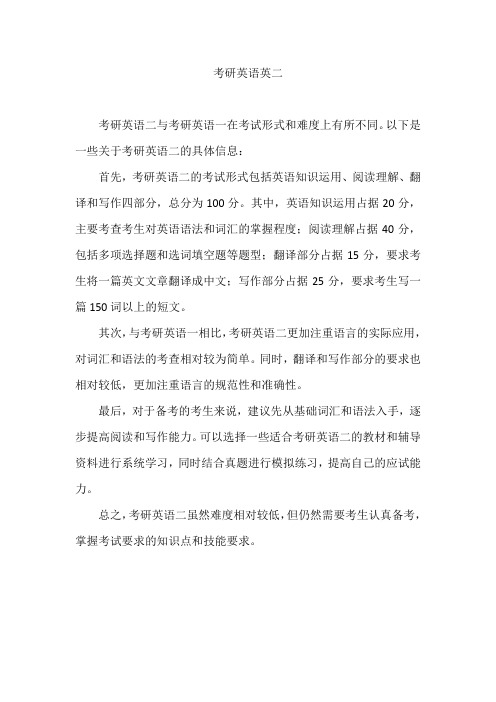
考研英语英二
考研英语二与考研英语一在考试形式和难度上有所不同。
以下是一些关于考研英语二的具体信息:
首先,考研英语二的考试形式包括英语知识运用、阅读理解、翻译和写作四部分,总分为100分。
其中,英语知识运用占据20分,主要考查考生对英语语法和词汇的掌握程度;阅读理解占据40分,包括多项选择题和选词填空题等题型;翻译部分占据15分,要求考生将一篇英文文章翻译成中文;写作部分占据25分,要求考生写一篇150词以上的短文。
其次,与考研英语一相比,考研英语二更加注重语言的实际应用,对词汇和语法的考查相对较为简单。
同时,翻译和写作部分的要求也相对较低,更加注重语言的规范性和准确性。
最后,对于备考的考生来说,建议先从基础词汇和语法入手,逐步提高阅读和写作能力。
可以选择一些适合考研英语二的教材和辅导资料进行系统学习,同时结合真题进行模拟练习,提高自己的应试能力。
总之,考研英语二虽然难度相对较低,但仍然需要考生认真备考,掌握考试要求的知识点和技能要求。
英语二试题及答案
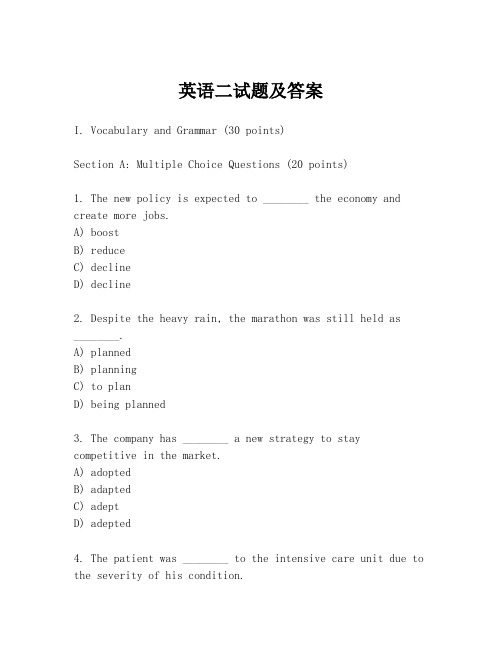
英语二试题及答案I. Vocabulary and Grammar (30 points)Section A: Multiple Choice Questions (20 points)1. The new policy is expected to ________ the economy and create more jobs.A) boostB) reduceC) declineD) decline2. Despite the heavy rain, the marathon was still held as________.A) plannedB) planningC) to planD) being planned3. The company has ________ a new strategy to stay competitive in the market.A) adoptedB) adaptedC) adeptD) adepted4. The patient was ________ to the intensive care unit due to the severity of his condition.A) transferredB) transformedC) translatedD) transcribed5. The detective was able to ________ the truth from the witness by asking the right questions.A) deduceB) induceC) reduceD) concludeSection B: Cloze Test (10 points)6. The ________ of the old bridge is a concern for the local government.A) maintenanceB) maintenancesC) maintainD) maintaining7. The ________ of the new law has been postponed until next year.A) enforcementB) enforcementsC) enforceD) enforcing8. The ________ of the company's success is largely attributed to its innovative approach.A) creditB) creditsC) creditingD) credited9. The ________ of the ancient ruins has been a subject of interest for archaeologists.A) preservationB) preservationsC) preserveD) preserving10. The ________ of the building was completed in 2008.A) constructionB) constructionsC) constructD) constructingII. Reading Comprehension (40 points)Section A: Reading Passages (20 points)Passage 1The impact of technology on education has been profound. With the advent of the internet, students have access to a wealth of information at their fingertips. However, the digital divide still exists, with some students having limited access to technology. This has led to a call for more equitable distribution of resources to ensure that all students can benefit from technological advancements.Questions:11. What is the main topic of the passage?A) The history of educationB) The impact of technology on educationC) The role of the internet in educationD) The digital divide in education12. What does the passage suggest about students with limited access to technology?A) They are not affected by the digital divide.B) They have a wealth of information at their fingertips.C) They are at a disadvantage compared to other students.D) They are not interested in technological advancements.Section B: Matching (20 points)Passage 2The concept of sustainable development has been widely discussed in recent years. It involves meeting the needs of the present without compromising the ability of future generations to meet their own needs. This includes economic, social, and environmental aspects, and requires a balanced approach to ensure that all three are considered.Questions:13. What is the focus of sustainable development?A) Economic growth onlyB) Social progress onlyC) Environmental protection onlyD) A balance of economic, social, and environmental considerations14. What does the term "sustainable development" imply?A) The use of resources that can be renewedB) The development that benefits only the present generationC) The development that ignores the needs of future generationsD) The development that focuses solely on environmental issuesIII. Writing (30 points)Task: Write an essay on the importance of environmental protection.In recent years, the environment has become a focal point of global concern. The degradation of natural habitats, pollution, and climate change are just a few of the challenges that we face. It is imperative that we take action to protect our environment for the sake of our health, our economy, and the well-being of future generations. Discuss the importance of environmental protection and suggest ways in which individuals and governments can contribute to this effort.[Your essay should be written in English and should be no less than 150 words.]。
2024年考研英语二试题

2024年考研英语二试题一、选择题(每题2分,共20分)The success of the project depends largely on _______ cooperation of all the departments.A. theB. aC. anD. /After _______ seemed like hours of waiting, the doctor finally came into the operating room.A. itB. thatC. whatD. whichIt was not until midnight _______ he finished his work.A. whenB. thatC. whileD. asThe manager suggested that the meeting _______ postponed until next week.A. beB. should beC. would beD. isThe book, written in simple language, _______ mainly for beginners.A. is intendedB. are intendedC. intendD. to intend_______ the help of the local guide, we found the hidden treasure easily.A. WithB. UnderC. ByD. OnThe young man is said _______ abroad soon.A. to have studiedB. to studyC. to be studyingD. to have been studying— Do you know if he _______ to the party?— I think he will come if he _______ free.A. comes; isB. will come; will beC. comes; will beD. will come; isThe research findings suggest that children's early exposure to music _______ their later development of reading and mathematical skills.A. benefitsB. benefitC. benefitedD. benefiting_______ the development of technology, people's lives have been greatly improved.A. WithB. BecauseC. Thanks toD. As a result of二、填空题(每题1分,共10分)1.The teacher asked the students to _______ (完成) the assignment before the nextclass.2.The _______ (主要的) reason for his failure was his lack of preparation.3.The _______ (景色) of the mountain was breathtaking, especially at sunrise.4.The company _______ (专注) on developing innovative products to meet marketdemand.5.The _______ (政府) has taken measures to address the issue of air pollution.6.After years of hard work, he finally achieved his lifelong _______ (目标).7.The _______ (研究) findings were published in a leading scientific journal.8.The movie was so _______ (感人的) that many audience members wept during theending.9.The _______ (教授) gave a lecture on the history of art last week.10.The _______ (经理) of the company is responsible for making important decisions.三、作文(20分)Title: The Impact of Technological Advancements on EducationDirections: Write an essay of about 200 words on the impact of technological advancements on education. Discuss the benefits and challenges brought by these advancements and your personal view on how to make the most of them in education.。
英语二考试内容
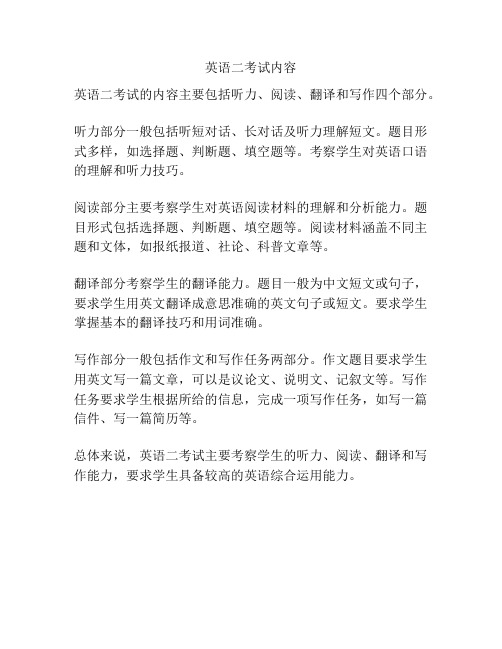
英语二考试内容
英语二考试的内容主要包括听力、阅读、翻译和写作四个部分。
听力部分一般包括听短对话、长对话及听力理解短文。
题目形式多样,如选择题、判断题、填空题等。
考察学生对英语口语的理解和听力技巧。
阅读部分主要考察学生对英语阅读材料的理解和分析能力。
题目形式包括选择题、判断题、填空题等。
阅读材料涵盖不同主题和文体,如报纸报道、社论、科普文章等。
翻译部分考察学生的翻译能力。
题目一般为中文短文或句子,要求学生用英文翻译成意思准确的英文句子或短文。
要求学生掌握基本的翻译技巧和用词准确。
写作部分一般包括作文和写作任务两部分。
作文题目要求学生用英文写一篇文章,可以是议论文、说明文、记叙文等。
写作任务要求学生根据所给的信息,完成一项写作任务,如写一篇信件、写一篇简历等。
总体来说,英语二考试主要考察学生的听力、阅读、翻译和写作能力,要求学生具备较高的英语综合运用能力。
自考英语二历年真题
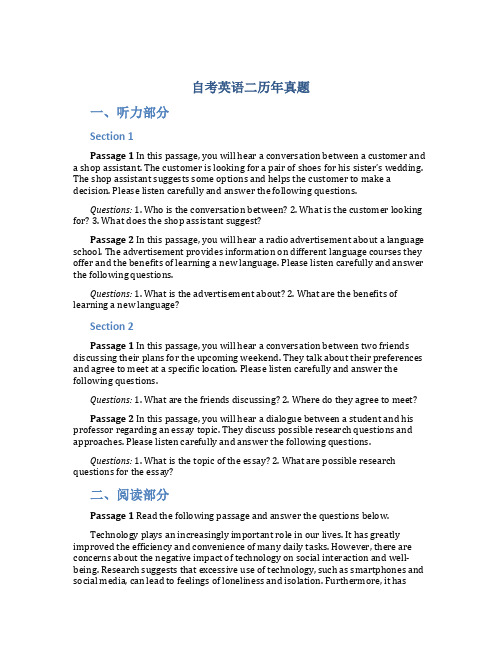
自考英语二历年真题一、听力部分Section 1Passage 1 In this passage, you will hear a conversation between a customer and a shop assistant. The customer is looking for a pair of shoes for his sister’s wedding. The shop assistant suggests some options and helps the customer to make a decision. Please listen carefully and answer the following questions.Questions: 1. Who is the conversation between? 2. What is the customer looking for? 3. What does the shop assistant suggest?Passage 2 In this passage, you will hear a radio advertisement about a language school. The advertisement provides information on different language courses they offer and the benefits of learning a new language. Please listen carefully and answer the following questions.Questions: 1. What is the advertisement about? 2. What are the benefits of learning a new language?Section 2Passage 1 In this passage, you will hear a conversation between two friends discussing their plans for the upcoming weekend. They talk about their preferences and agree to meet at a specific location. Please listen carefully and answer the following questions.Questions: 1. What are the friends discussing? 2. Where do they agree to meet?Passage 2 In this passage, you will hear a dialogue between a student and his professor regarding an essay topic. They discuss possible research questions and approaches. Please listen carefully and answer the following questions.Questions: 1. What is the topic of the essay? 2. What are possible research questions for the essay?二、阅读部分Passage 1 Read the following passage and answer the questions below.Technology plays an increasingly important role in our lives. It has greatly improved the efficiency and convenience of many daily tasks. However, there are concerns about the negative impact of technology on social interaction and well-being. Research suggests that excessive use of technology, such as smartphones and social media, can lead to feelings of loneliness and isolation. Furthermore, it hasbeen found that the constant exposure to screens can affect sleep patterns and mental health. It is important to find a balance between the benefits and drawbacks of technology to ensure a healthy and fulfilling life.Questions: 1. What benefits does technology bring to our lives? 2. What are the concerns about the negative impact of technology?Passage 2 Read the following passage and answer the questions below.Climate change is a pressing issue that affects the entire planet. It refers to long-term changes in temperature and weather patterns, primarily caused by human activities such as burning fossil fuels and deforestation. The consequences of climate change are far-reaching and include rising sea levels, extreme weather events, and ecosystem disruptions. To mitigate the effects of climate change, it is crucial for individuals and governments to take action, such as reducing carbon emissions, promoting renewable energy sources, and implementing sustainable practices.Questions: 1. What is climate change? 2. What actions can individuals and governments take to mitigate the effects of climate change?三、写作部分Write an essay of at least 200 words on the following topic:The Importance of Education in SocietyEducation plays a vital role in shaping society and individuals’ lives. It is the key that unlocks doors to knowledge, opportunities, and personal growth. In a rapidly changing world, education equips individuals with the skills and knowledge needed to adapt, succeed, and contribute to society.Firstly, education empowers individuals by providing them with the necessary tools to navigate through life. It equips them with essential literacy and numeracy skills, enabling them to communicate effectively, solve problems, and make informed decisions. Additionally, education fosters critical thinking and encourages individuals to question, analyze, and evaluate information, which is essential in today’s era of misinformation and fake news.Furthermore, education promotes social cohesion and equality. It serves as a mechanism for social mobility, enabling people from diverse backgrounds to access equal opportunities and fulfill their potential. Education encourages understanding, acceptance, and empathy, creating a more inclusive and harmonious society.Moreover, education is the foundation for economic growth and development. It provides individuals with the skills and knowledge required for employment and entrepreneurship, contributing to economic productivity and innovation. A well-educated workforce is essential for a country’s competitiveness in the global market.In conclusion, education is of utmost importance in society. It empowers individuals, promotes social cohesion, and drives economic growth. To build a prosperous and sustainable future, it is essential to prioritize investment in education and ensure equal access to quality education for all.。
考研英语二技巧
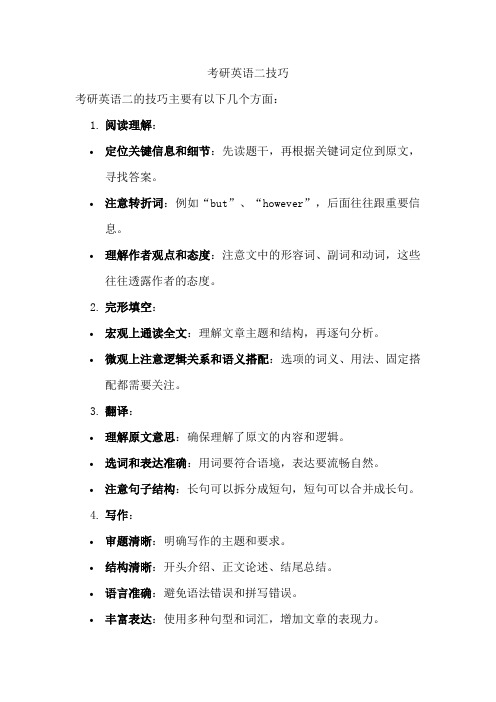
考研英语二技巧
考研英语二的技巧主要有以下几个方面:
1.阅读理解:
•定位关键信息和细节:先读题干,再根据关键词定位到原文,寻找答案。
•注意转折词:例如“but”、“however”,后面往往跟重要信息。
•理解作者观点和态度:注意文中的形容词、副词和动词,这些往往透露作者的态度。
2.完形填空:
•宏观上通读全文:理解文章主题和结构,再逐句分析。
•微观上注意逻辑关系和语义搭配:选项的词义、用法、固定搭配都需要关注。
3.翻译:
•理解原文意思:确保理解了原文的内容和逻辑。
•选词和表达准确:用词要符合语境,表达要流畅自然。
•注意句子结构:长句可以拆分成短句,短句可以合并成长句。
4.写作:
•审题清晰:明确写作的主题和要求。
•结构清晰:开头介绍、正文论述、结尾总结。
•语言准确:避免语法错误和拼写错误。
•丰富表达:使用多种句型和词汇,增加文章的表现力。
5.词汇和语法:这是基础,需要平时积累。
可以通过阅读、写作
来提高词汇量和语感。
6.模拟题练习:多做模拟题,熟悉题型和考试流程,找到自己的
弱点,针对性地加强练习。
7.保持积极心态:考试压力可能会影响发挥,保持乐观、积极的
心态很重要。
- 1、下载文档前请自行甄别文档内容的完整性,平台不提供额外的编辑、内容补充、找答案等附加服务。
- 2、"仅部分预览"的文档,不可在线预览部分如存在完整性等问题,可反馈申请退款(可完整预览的文档不适用该条件!)。
- 3、如文档侵犯您的权益,请联系客服反馈,我们会尽快为您处理(人工客服工作时间:9:00-18:30)。
• b. Television is not only boring, but it also wastes a lot of time. 电视不仅乏味,而且 还浪费许多时间。
• 3.谓语动词的数应与but also后主语的数保持一 致: (就近原则) • Not only you but also Mr Zhang teaches in this college. • 不仅你,张老师也在此学院教书。 • 4. not only放在句首,后接句子时要用倒装结构: • Not only does television appeal to those who can read but to those who can't. 电视不仅吸引阅读的 人,而且也吸引了不会阅读的人。
• For sale 供出售,待售; • On sale 促销 • Sell–sold—sold ; sale n. seller n. salesman/person n. • Be likely to do 很可能 • Refer to…as 把…称为…; • The vast majority of 绝大多数; • Specialize in 专门从事,专门研究;
LOGO
Language points
Para.6
• • • • Consider…as 把…当做是; Consider +doing 考虑做什么; We are considering going to Canada. 我们正考虑到加拿大去. Consideration n. 考虑; • Considerable adj. 大量的,相当多的; • Considerate adj. 体贴的,周到的; • Take … into consideration/account 把…考虑在 内;
Text B
• Different prices and qualities-----a great variety of shops in the US. (para.1-3) • Para.4 department stores; • Para.5 discount houses; • Para.6 small shops • Para.7 dime store; • Para.8 supermarkets
LOGO
形容词副词比较级
最高级
• “主语+be + one of the + adj.最高级+复数n. +in/of短语”表示“……是……中最……之一”。 • Beijing is one of the largest cities in China.北 京是中国最大城市之一。
LOGO
Unit 12 Text A
LOGO
就近原则
• 也称“邻近原则”“就近一致原则”(Proximity), 即:谓语与靠近的名词、代词在“人称、数”上 一致。 • 由下列词语连接的并列主语: • “there be+句型; or ; either …or; nor; neither…nor; whether…or;not…but; not only…but also" ; 等。 • ①What he does or what he says does not concern me. • 他的行为或言谈都与我无关。 • ②Neither you nor I am wrong . 你和我都没错。 • ③Not you but your father is to blame. • 不是你,而是你父亲该受责备。 • ④Not only you but(also) he is wrong. LOGO • 不仅你错了,他也错了。
LOGO
• • • • • • • • • • • •
Para.1 decide to do decision n. make a decision do some + 动名词 do some shopping/washing; Sort v. sort out /through 整理,分类 get rid of 去除,消除;摆脱(坏习惯); The+ 姓氏s:表示某某夫妇或者某某一家; The Smiths, the Turners; Needn’t have worried 本不必担忧 all but: but 作“除了”讲; All students but Tom passed the exam. Leave sb/sth +adj 使…处于某种状态
• • • • • • • • • • • It is widely believed that …普遍认为; (a) dispute with… 和…争执; Bring up 抚养,养育; quarrel with 和…吵架; Regard…as … 把…看做…; As rerdless of sth不顾,不管; Begin/ start with…以…开始; Occupy v. 占据 (时间,空间) Be occupied with 忙于; Occupation n. 职业
Unit 11 Text A
The Great American Garage Sale
Text Structure
1. a story ------garage sale/yard sale,… (para.1-4); 2. Reasons for such sales (para.5-8) rising living costs are considered …as a reason for… but beyond that, they are fun; some people have made garage-sale shopping into a hobby; 3. The future of such sales.
LOGO
• • • • • •
A reason for … Enjoy doing 喜欢做;enjoy oneself 玩的开心; Be fed up with 对…不满;受够了…; Search for 搜寻,搜索; Last adj. 上一个 last year, last night; v. 持续 How long did the movie last?
LOGO
• 1. “A+ be +adj.比较级+than +any other+单数n(+介词短 语)”表示“A比同一范围的任何一个人/物都……”,含义 是“A最……”。 • The Yangtze River is longer than any other river in China.长江 比中国的任何一条其他的河都长。 • =The Yangtze River is the longest river in China. • 2. “A+实意v.+adv.比较级+than +any other+单数n.(+介词 短语)”表示“A比同一范围的任何一个人/物都……”,含 义是“A最……”。 • Mike gets to school earlier than any other student in his class. • = Mike gets to school earliest in his class. • 3 “比较级+and+比较级”表示“越来越……”。 • He is getting taller and taller. • He does his homework more and more carefully.他做作业越 来越认真了。 • 4. the adj 比较级+ of the two… • Tom is the taller of the two boys.
LOGO
• Find sb/sth doing 发现…在做…; • Mother found her son lying on the ground without any movement. • Urge sb to do 敦促,催促; • “not only … but also …”是一个并列连词词组,其意思基本 等于“both … and …”,但侧重点放在“but also”上,使用 时须遵守一定的规则。以下两句是欠妥或错误的: • 1. Sitting up late last night, Tom not only read the assignment but also many poems by his favorite poet. • 2. Not only the students but also the teacher were invited. • 上述两句第一句欠妥,第二句是错误的,应分别改为: • 1. Sitting up late last night, Tom read not only the assignment but also many poems by his favorite poet. • 昨晚汤姆熬至深夜,不仅看了课外作业,而且读了他最喜 欢的一位诗人的许多诗歌。 • 2. Not only the students but also the teacher was invited. • 不仅学生们被邀请,而且那位教师也被邀请了。
LOGO
• spend+ 一段时间/钱 + (in)doing sth/ on sth; 花费,度过; • Run across 偶遇; • Be bound to do 一定会; • Be faced with 面对,面临; • Be confronted with
LOGO
• Text Structure
LOGO
Language points
• 1. not only与but also后面所连接的词的词性必须对等: • (1) Franklin was considered not only an inventor, but also a statesman. 富兰克林不仅被看作发明家,而且 被看作政治家。 • (2) The nurse was not only competent but also kind. 这 位护士不仅能干而且亲切和蔼。 • (3) Not only you but also she has to attend the ceremony. 不令你而且她也得参加典礼。 • (4) They completed the project not only punctually but also perfectly. 他们不仅准时完成工程,而且完成得 很出色。 • 2. not only只能连用,而but also既可连用,也可分开 用: • a. He speaks not only English, but also French. 他不仅 说英语,还说法语。
